In this ultimate accessory guide you’ll find my recommended accessories for the Sony A7III mirrorless camera in 2024.
Please let me know in the comments below if there are any accessories that you think deserve to be mentioned.
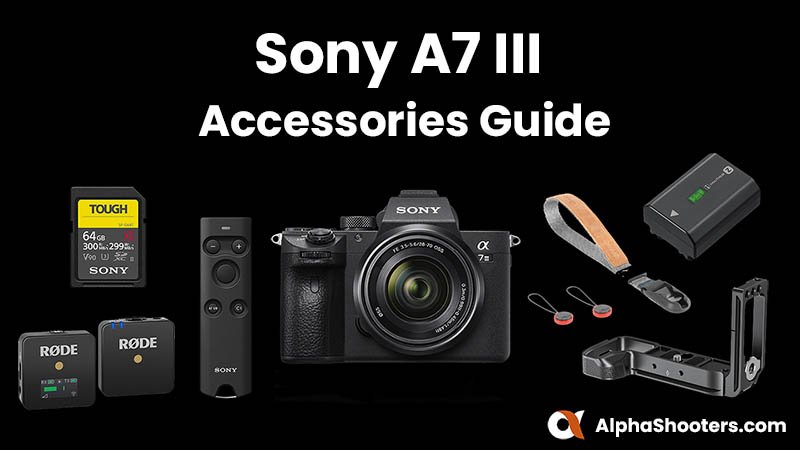
Table of Contents[Hide][Show]
Top 10 Sony A7III Accessories+−
- 1. Sony PCK-LG1 Screen Protector
- 2. Rocket Air Blaster Large
- 3. Lennon Gecco LB3 Quick Release Plate Hand Grip Extension
- 4. Sony RMT-P1BT Remote Commander
- 5. Sony NP-FZ100 Battery and BC-QZ1 Charger
- 6. SanDisk Extreme Pro UHS-II (300/260)
- 7. Rode VideoMicro
- 8. Peak Design Travel Travel Tripod Carbon
- 9. Peak Design Cuff + Slide Lite Straps
- 10. Think Tank / MindShift Backlight 18L Backpack
Tripods and Monopods+−
- Peak Design Travel Travel Tripod Carbon
- Sirui W-2204 Waterproof Tripod
- Gitzo Mountaineer Series 3, 3 Section Tripod (GT3532)
- Really Right Stuff TVC-33 MK2 / TFC-33 MK2 Tripods
- Manfrotto MT055XPRO3 055 Aluminum 3-Section Tripod
- Manfrotto Befree Advanced Alpha Travel Tripod
- Sirui T-025SK Carbon Fiber Travel Tripod with Ball Head
- MeFOTO RoadTrip Travel Tripod
- Sirui P-326 6 Section Carbon Fiber Monopod
- Sony A7 III Lenses
Sony A7III Forum & Facebook Group
If you are looking for further help and advice on the A7III or would simply like to share your photos, then please head over to our friendly full-frame Forum. If you prefer Facebook then I also run the Sony A7III Shooters Group.
Top 10 Sony A7III Accessories
First up, my top 10 recommended accessories for the Sony a7III.
1. Sony PCK-LG1 Screen Protector
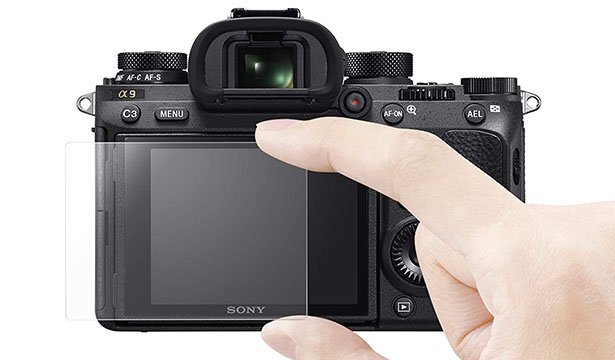
Sony’s official screen protector for the a7III is the PCK-LG1. You’ll find that the PCK-LG1 is labelled as the screen protector for the Sony a9 in many stores, but rest assured this is also supported fully with the a7 III. You can check the compatibility information here on Sony’s website. I’ve been using this screen protector on my a7III since day one. It’s well made and doesn’t affect the touch screen operation at all.
2. Rocket Air Blaster Large

The Rocket Air Blaster is really a must have item for your gear bag, if you don’t already own one then please make this your next purchase. It’s ideal for blowing dust off your lenses, sensor and filters. I have a couple of these as one never leaves my bag and the other stays at home.
3. Lennon Gecco LB3 Quick Release Plate Hand Grip Extension
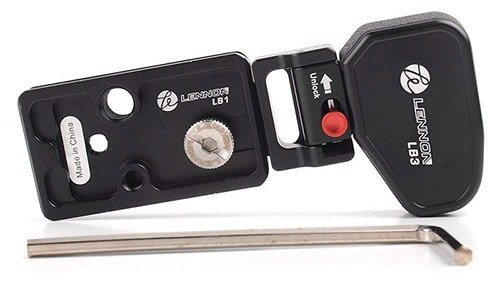
The Lennon Gecco LB3 combines a grip extension and a traditional arca swiss plate. The grip is attached via the a7III’s tripod socket and provides somewhere for you little finger to rest. Both Sony and Meike also offer similar grips but they need to be removed to change the battery. The Lennon grip however also includes an unlock button so that you can change your cameras battery without removing the grip itself. There is also an additional side plate (Lennon LB2) that can be purchased to turn the grip into an L-bracket.
Price Check & Buyer Reviews for Lennon Gecco LB3
At: Amazon
Price Check & Buyer Reviews for Lennon Gecco LB2
At: Amazon
4. Sony RMT-P1BT Remote Commander
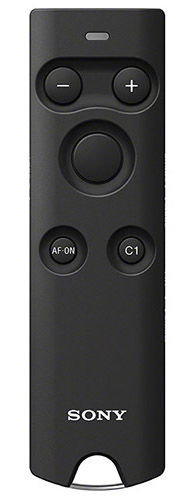
The Sony RMT-P1BT Remote Commander is the newest remote control option for the Sony a7III. The RMT-P1BT operates using Bluetooth connectivity which provides a reliable connection even in bright sunlight or when there are obstacles between the commander and the a7III. In my own tests the RMT-P1BT remote works reliably up to around 18m or 60 feet away from the camera, and this is the case whether you are behind or in front or the camera, indoors or outdoors.
It features a fast 0.05 seconds release time and an external LED that flashes or lights continuously to show shutter, movie recording and AF status. The remote covers essential camera controls including releasing the shutter, a focus button, a lock switch that prevents accidental operation during transport, movie recording start/stop and power/digital zoom. There are also two custom buttons that mirror the functions of the C1 and AF-ON buttons on the camera body.
When the Bluetooth Remote option is enabled in the a7III settings the Location Info. Link is disabled. So if you are using Imaging Edge Mobile to record your location information via bluetooth, I’m afraid this will not work at the same time as the remote.
Unlike the older RMT-DSLR2 remote, the RMT-P1BT also supports burst shooting. So when you are in continuous shooting mode you can hold down the shutter button to shoot continuously.
Please note that this remote is only supported if you have updated the Sony a7III firmware to version 3.00 or later.
5. Sony NP-FZ100 Battery and BC-QZ1 Charger
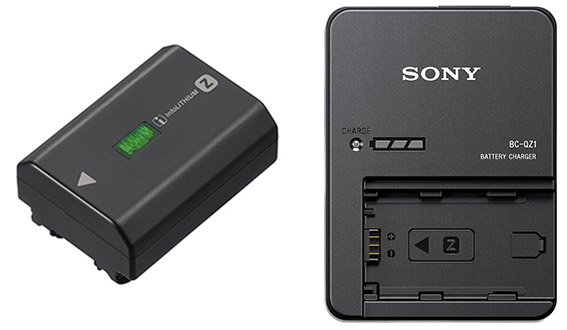
The Sony a7 III uses the new NP-FZ100 which doubles the battery life compared with the smaller NP-FW50 battery found in the a7 II. Still, if you are shooting all day then you will probably go through at least one battery. Personally I’ve never gone through more than two NP-FZ100 batteries in one day whilst shooting wildlife and motorsport (stills) with my a7III. That said, I still have 4 of these batteries just to be safe!
The Sony a7 III does not include the Sony BC-QZ1 charger in the box. You can still charge the NP-FZ100 battery in camera via USB but this takes approximately 5 hours to fully charge one official NP-FZ100 battery, compared with only 2.5 hours when charged via the Sony BC-QZ1 wall charger.
6. SanDisk Extreme Pro UHS-II (300/260)
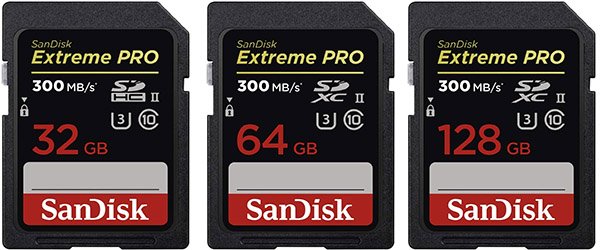
The SanDisk Extreme Pro cards have a claimed read speed of 300MB/s and a write speed of 260MB/s. The only cards that are slightly faster are the Sony SF-G cards, however these have been made obsolete unfortunately.
The Sony SF-G Tough cards should be the fastest, however in my Sony a7III Memory Card Speed Tests the Sony SF-G Tough cards are underperforming in the a7III possibly due to a firmware issue. Therefore I recommend the SanDisk Extreme Pro UHS-II (300/260) cards instead.
For further options just jump to the Memory Card section of this guide.
7. Rode VideoMicro
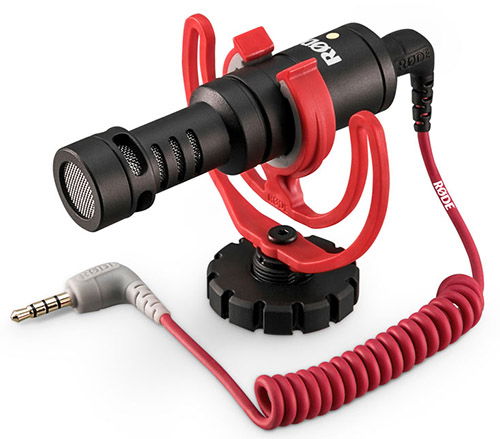
If you aren’t happy with the quality of the internal microphone on the a7III and the Rode VideoMic Pro+ is a little too pricy, then the Rode VideoMicro is a great alternative. It’s much smaller and lighter than the Pro+ version and it does not require an additional battery, you simply connect it through the mic port on the a7III.
8. Peak Design Travel Travel Tripod Carbon

The Peak Design Travel tripod raised over $12 million on Kickstarter in 2019, largely due to its unique compact design and Peak Designs reputation for building high quality products.
There are two versions of this tripod available, a carbon model that weighs 1.27 kg (2.81 lbs.), and the aluminum model that weights 1.56 kg (3.44 lbs.). Both versions have a maximum weight capacity of 9.1 kg (20 lbs.) so you can even use this tripod with telephoto lenses.
The tripod features a very compact form factor and 5 section quick release legs that deploy in seconds without having to flip over like traditional travel tripod legs.
There’s an omnidirectional ergonomic ball head included that is compatible with all PD plates and most 3rd party Arca-type plates.
When collapsed the tripod measure 39.1 cm (15.4”) in length and 7.9 cm (3.125″) in diameter. The maximum height (center column raised) is 152.4 cm (60″), or 130.2 cm (51.25″) with the center column down. The minimum height (low mode) is 14 cm (5.5”).
The following accessories and tips video provides a lot more details on this unique tripod:
So far I’ve resisted the temptation to order this tripod myself, but I don’t think I’m going to be able to resist it for much longer.
Price Check & Buyer Reviews: Peak Design Travel Travel Tripod
At: Peak Design | Amazon | B&H Photo
9. Peak Design Cuff + Slide Lite Straps
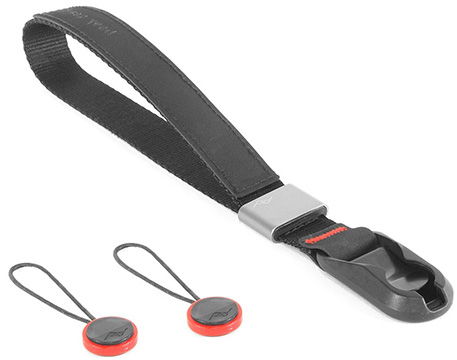
The Peak Design Cuff wrist strap is a great way to protect your camera from accidental drops. It connects to the a7III via Peak Designs anchor system and the wrist loop magnetically locks in the open position, or comfortably cinches down on your wrist for added security. It took me a little while to get used to the magnetic lock, but now I wouldn’t want to be without this strap.
The Peak Design Slide Lite can be worn as a sling, neck, or shoulder strap. It uses internally-padded nylon webbing has a smooth side that glides over clothing in sling mode and a grippy side that prevents slipping in shoulder mode.
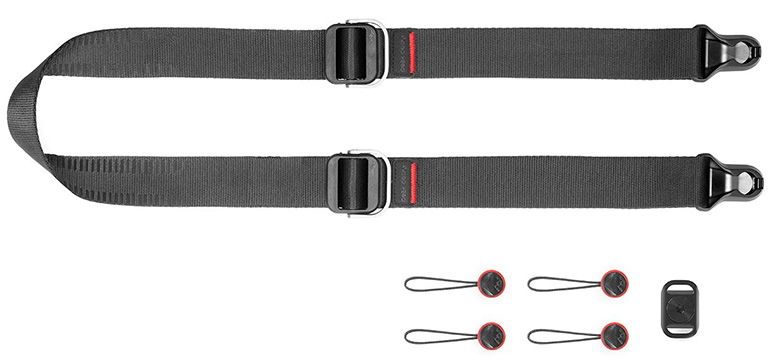
There are two versions of the slide strap, a full sized version with a strap width of 45mm, and a lite version with a strap width of 32mm. I’ve been using the full sized version of this strap for over a year, but it’s overkill for a mirrorless camera like the a7III. So I’d recommend going with the Lite version which I’ve also since picked up and now the full sized version never gets clipped on!
Price Check & Buyer Reviews for Peak Design Cuff
At: Peak Design | Amazon | B&H Photo
Price Check & Buyer Reviews for Peak Design Slide Lite
At: Peak Design | Amazon | B&H Photo
10. Think Tank / MindShift Backlight 18L Backpack
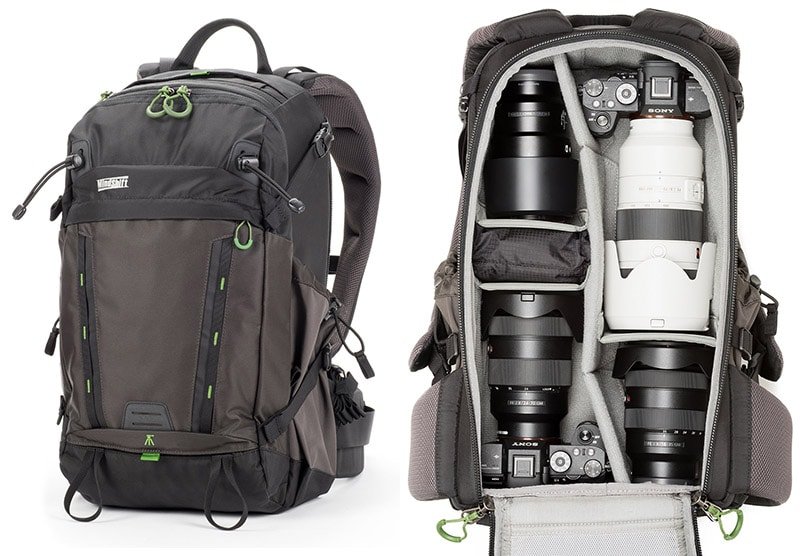
I own this bag myself although in the woodland green color and not charcoal grey like pictured above. It’s extremely comfortable and the straps are well padded. I like to use this as my lightweight day pack and it will even fit my Sony FE 200-600 attached to the camera (with lens hood reversed).
You access your camera gear through the rear access panel which you can also access without taking the backpack off by simply rotating the bag to the front of your body while the waist belt is still secured. There’s a dedicated compartment that will fit up to a 13” laptop or tablet, front storage pockets totalling 5L of space and great for any personal gear like a light jacket or food. There’s also a seam-sealed rain cover included. The pack weighs 3.5 lbs. (1.6 kg) and has a total volume of 18 liters.
The exterior dimensions are 10.6” W x 18.5” H x 7.1” D (27 x 47 x 18 cm) so it also meets most international and US carry-on requirements. Internal dimensions are 9.4” W x 16.7” H x 5.5” D (24 x 42.5 x 14 cm).
If 18L is not large enough then there is also a 26L and 36L version available, I also have the 36L myself.
Price Check & Buyer Reviews for MindShift TrailScape 18L Backpack
At: Think Tank | Amazon | B&H Photo
If you would like to take a closer look at any of these top 10 accessories for the a7III, then I’ve also talked about them in this YouTube video.
Batteries
Sony mirrorless cameras packed full of technology are always going to need lots of juice. So here are your best battery options for the Sony a7 III. For a more comprehensive guide to batteries and chargers for the a7III, see my guide here.
Sony NP-FZ100 Battery
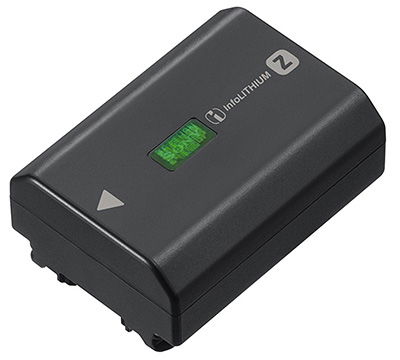
The Sony a7 III uses the new NP-FZ100 which doubles the battery life compared with the smaller NP-FW50 battery found in the a7 II. Still, if you are shooting all day then you will probably go through at least one battery. Personally I’ve never gone through more than two NP-FZ100 batteries in one day whilst shooting wildlife and motorsport (stills) with my a7 III. That said, I still have 4 of these batteries just to be safe!
NP-FZ100 RAVPower
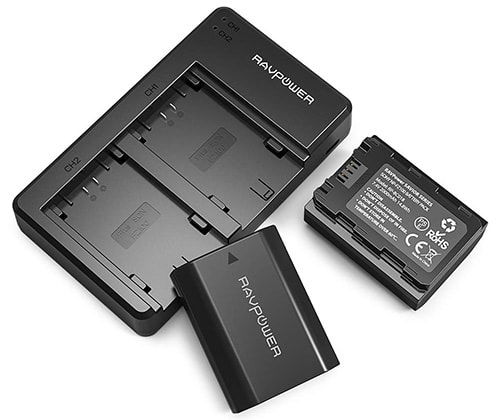
If you do insist on using third-party batteries in your a7III then the RAVPower NP-FZ100 are reported to work well and not throw up any error messages at this time. These batteries are also bundled together with a dual charger. Their capacity is 2000mAh compared with 2280mAh for the official Sony NP-FZ100 batteries so they don’t last quite so long.
Price Check & Buyer Reviews for RAVPower NP-FZ100
At: Amazon
Battery Chargers
Sony decided not to include an external battery charger in the box with the Sony a7III. You can charge the battery in the camera with the supplied micro usb cable, but if you want to charge the externally here are your best options.
Sony BC-QZ1 Charger

If you charge the NP-FZ100 battery inside the a7iii it takes approximately 5 hours to fully charge one official NP-FZ100 battery, compared with only 2.5 hours when charged via the Sony BC-QZ1 charger.
Sony BC-ZD1 Dual Battery Charger
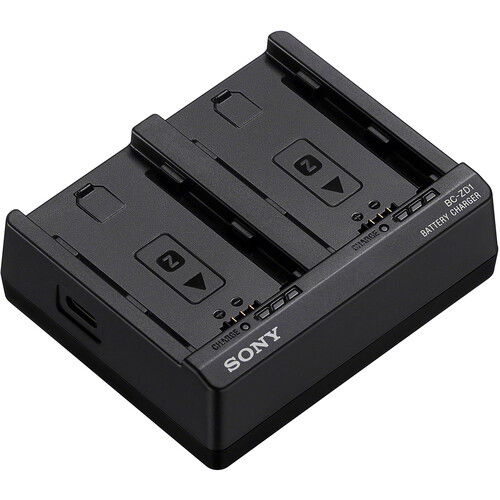
The BC-ZD1 is a high-speed charger for Sony’s NP-FZ100 batteries. It can simultaneously charge two batteries in approximately 155 minutes when connected to a USB Power Delivery (PD) compatible power supply with 30W or higher output and a USB cable with USB PD support (3A) or higher current.
- Charges two NP-FZ100 batteries simultaneously in approximately 155 minutes when connected to a USB PD compatible power supply
- Equipped with an indicator lamp that shows the battery charging status in 5 stages
- Width approx. 84.5 mm x Height approx. 29.2 mm x Depth approx. 70.0 mm, weight approx. 149g
- With heat dissipation measures plus built-in heat monitoring and control
Check Price & Reviews: BC-ZD1 Dual Battery Charger
At: B&H Photo | Amazon
Sony NPA-MQZ1K Multi Battery Adaptor Kit
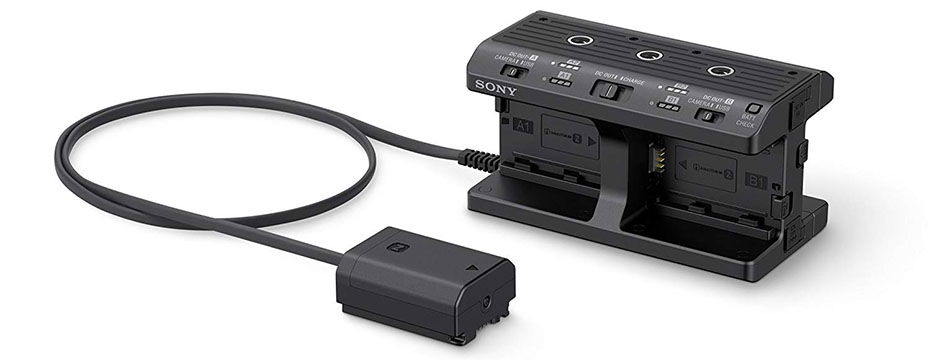
The Sony NPA-MQZ1K multi battery kit might be a very useful addition to your a7 III if you shoot very long video sessions and need as much power as possible. This kit can charge four batteries (NP-FZ100) in approximately 480 minutes. It also allows you to power two USB devices as well as the camera at the same time. The NPA-MQZ1K also includes two NP-FZ100 batteries, a cable protector and a mounting plate. You can find full details on Sony’s website here.
Anker PowerCore 20100mAh Portable Charger
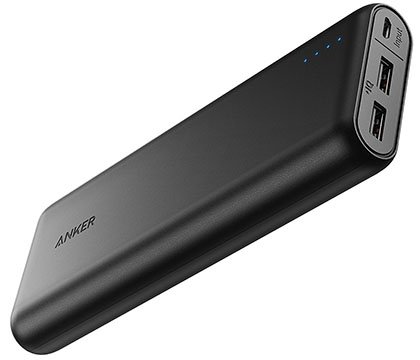
You can also charge your a7III via usb whilst on the move. My personal favourite portable charger is the Anker PowerCore 20100mAh portable charger. Although designed for smartphones and tablets, they are also great for charging your a7III on the go via USB.
The charger will let you charge a single Sony NP-FZ100 battery inside the a7III approximately 4 times.
Price Check & Buyer Reviews for Anker PowerCore 20,100mAh
At: Amazon
Battery Grips
If you’d like to double the battery life of the a7III and at the same time improve the ergonomics, then you might want to consider a battery grip.
Sony VG-C3EM Battery Grip
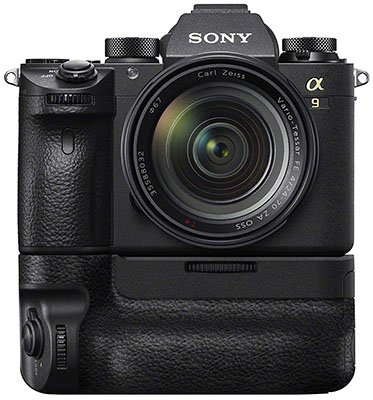
The Sony VG-C3EM battery grip is crafted from the same materials as the a7 III and it’s also weather sealed. The grip holds two NP-FZ100 batteries, thus doubling your shooting time, and can also be charged via the a7 III’s USB port.
As well as the shutter release button for when you are shooting in portrait orientation, there are also four programable custom buttons and an AF joystick.
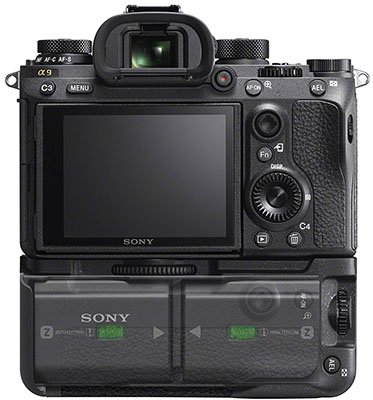
You do need to remove the battery door to attach the grip, which slots into the battery compartment on your a7 III. However, the door is easy to remove thanks to a small switch on the door itself.
The battery tray does unfortunately feel rather cheap and flimsy, otherwise this is a fantastic grip if not somewhat overpriced. I’m using it on my own a7III and find that as well as extended the battery life, it also helps with the ergonomics enormously. Read my Sony VG-C3EM Review for a closer look at this grip.
Meike MK-A9 Pro Battery Grip
If the official Sony battery grip is too expensive for your tastes, then thankfully Meike have a solution. Their MK-A9 Pro battery grip is very similar to the Sony VG-C3EM, yet it’s almost a third of the price. The grip itself doesn’t feel as nice as the Sony, but surprisingly the battery tray is actually better built. The button layout is the same, but it is missing the lock dial on the shutter button, so you’ll need to be careful not to inadvertently press this when shooting in landscape orientation.
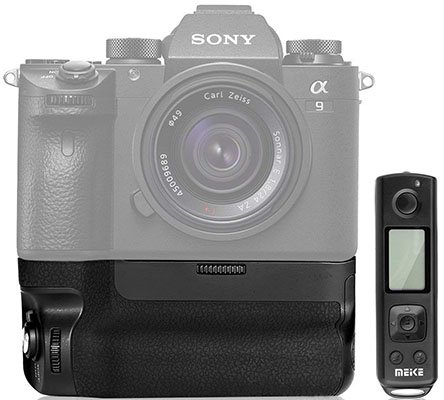
Meike actually trumps the Sony grip by providing a remote control that works up to 100 meters with a 2.4Ghz wireless transmission. It can be used to control the shutter in Bulb mode or set interval time shooting (time-lapse). This is really quite useful since the a7 III does not provide any time-lapse functionality.
A lot of people will purchase the Sony simply for continuity reasons (myself included), but if this doesn’t bother you then you certainly can’t go wrong with the Meike MK-A9 Grip.
Despite its product name (MK-A9), this grip is compatible with the a7 III. Read my full Meike MK-A9 Pro Battery Grip Review for a closer look at this grip.
Check Price & Buyer Reviews for Meike MK-A9 Pro
At: Amazon
My Thoughts on Third Party Batteries and Chargers for the a7 III
Although I have plenty of third party NP-FW50 batteries for my a6000/a6300/a6500 and a7R II, I’ll be sticking with the original Sony batteries and chargers for my a7III, at least until the third party options have been tried and tested for a little longer. As if my a7III goes up in smoke due to a dodgy battery, it’s unlikely that Sony will be replacing if for me. However, if you have taken the plunge with a third party battery for your a7 III, it would be great to hear how you are getting on in the comments below.
Memory Cards and SD Card Readers
There are hundreds of different memory cards / SD cards on the market but some are certainly faster and more reliable than others.
Please note that only slot 1 in the a7III supports the faster UHS-II memory cards, so for slot 2 I’d recommend using the less expensive UHS-I cards.
For more memory card tests and helpful information simply visit my Sony A7III Memory Card page.
SanDisk Extreme Pro UHS-II (300/260)

The SanDisk Extreme Pro cards have a claimed read speed of 300MB/s and a write speed of 260MB/s.
Lexar Professional 2000X UHS-II (300/260)
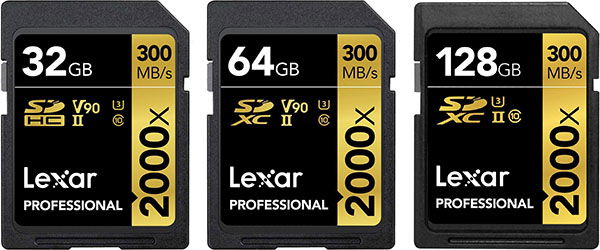
The Lexar Professional 2000X cards have a claimed read speed of 300MB/s and a write speed of 260MB/s.
Transcend SD 700S UHS-II (285/180)
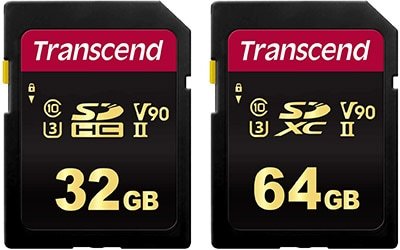
The Transcend SD 700S cards have a claimed read speed of 285MB/s and a write speed of 180MB/s.
Sony SF-G Tough UHS-II (300/299)
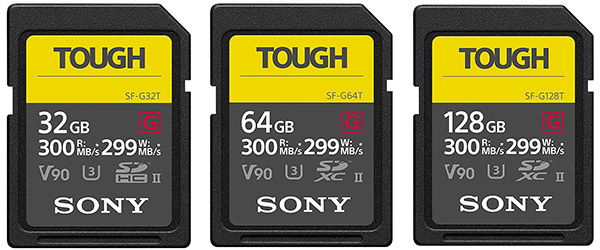
Tough memory cards are 18 times stronger than standard SD cards, bend proof to 180N, drop-proof to 5 meters, waterproof to a depth of 5 meters for up to 72 hours (IPX8 rating) and dustproof with an IP6X rating. The cards feature a one-piece ribless structure and don’t have the common lock switch, they are also X-ray proof, magnet proof, anti-static and temperature proof.
The Sony SF-G Tough cards have a claimed read speed of 300MB/s and a write speed of 299MB/s.
These cards should be in the joint top spot because they have identical write speeds to the Sony SF-G (Non Tough) cards but in the a7III they are underperforming by quite some margin. I’ve also tested the exact same cards in my Sony a7R IV and Sony a7R III and the in-camera write speeds are identical to the SF-G cards (as they should be). So I’m pretty certain there is a bug in the a7III firmware 3.10 causing these cards to underperform. When shooting jpegs the speeds are as they should be, but with raw files there’s an issue.
SanDisk Extreme Pro UHS-I (170/90)
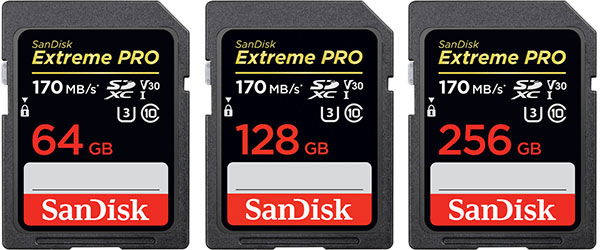
For memory card slot 2 I’d recommend the SanDisk Extreme Pro cards. These have a claimed read speed of 170MB/s and a write speed of 90MB/s.
Sony MRW-S1 High Speed UHS-II USB Memory Card Reader/Writer
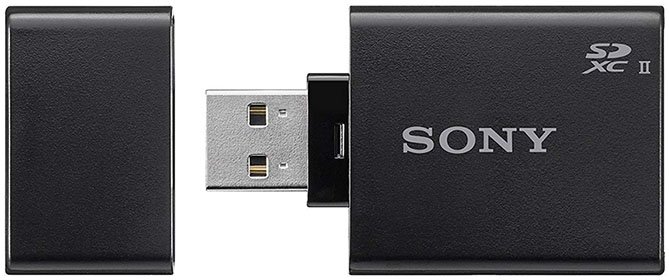
Sony’s MRW-S1 UHS-II USB SD Card Reader/Writer enables the fast transfer of data via a USB 3.1 interface. It can read/write to UHS-II SD Cards and is backward compatible with UHS-1 SD cards. It’s been designed with the Sony UHS-II SF-G series SD cards in mind but will also work with other UHS-II cards like the SanDisk Extreme Pro cards. The MRW-S1 together with Sony SF-G cards can transfer files to and from your computer at around 2.6x faster than UHS-1 cards.
Beeway Water & Shock Resistant Memory Card Case
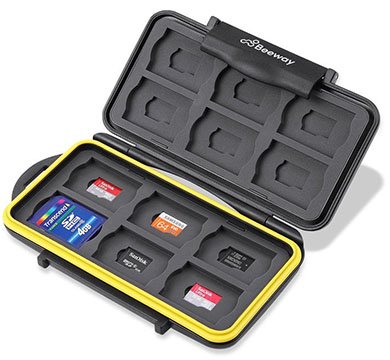
I don’t go anywhere without my Beeway SD Card holder. It holds 12 SD/SDHC/SDXC cards and 12 MicroSD cards perfectly in place. The case is water resistant and very strong. It also includes a small bag and a carabiner. It really is great value for the price.
Price Check & Buyer Reviews for Beeway Memory Card Case
At: Amazon
L-Brackets / Plates & Grip Extensions
The Sony a7III certainly has a lot of technology packed into a small body, although this is great when it comes to travelling light and packing small, some may find that it’s not the most comfortable camera to work with, especially if you are coming from a much larger SLR. Thankfully, as well as the battery grips mentioned above, there are a few more ways that you can improve the ergonomics of your a7 III, here are some of the most popular.
SmallRig L-Bracket
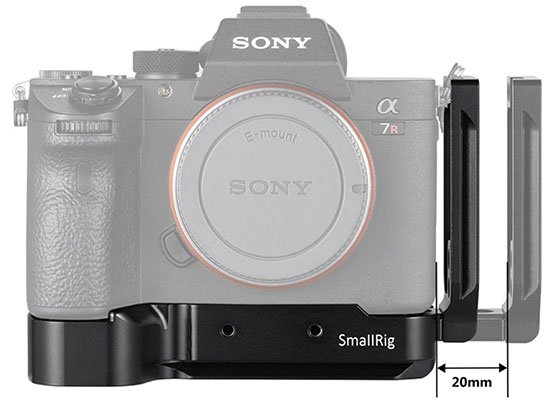
As well as offering easy mounting to tripods with the Arca-Swiss compatible mounts, the SmallRig l-bracket also doubles up as a grip extension, giving you somewhere to place your pinky finger if you are fed-up with it hanging off the bottom of your a7 III. The l-bracket is very well made, and includes a magnetic allen key housed on the bottom of the grip for easy attachment.
You can easily access all of the cameras ports and battery compartment with the l-bracket attached. My only gripe is that you have to really tighten the single fixing screw for a secure fit to the camera body. Still, this is my l-bracket of choice that I’m currently using. I’ve also written a short review of the SmallRig L-bracket.
Really Right Stuff L-Bracket
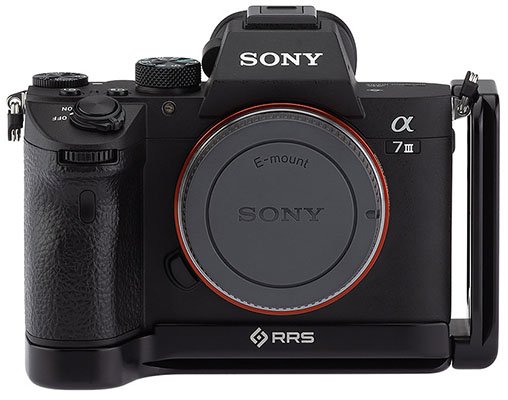
The RRS L-Plate has been designed to fit the Sony a7 III perfectly. You are still able to access all of the cameras ports, and just like the SmallRig l-bracket there is also a magnetic storage space for the included allen key. There is space to rest your pinky finger, and the l-bracket is fully arca swiss compatible. However, unlike the SmallRig l-bracket, you will need to remove the battery door to attach it.
The only real downside of the RRS bracket is the price, at around $200 it’s 3-4x the price of the SmallRig! Still, if you want the best then this is it.
Price Check & Buyer Reviews for RRS L-Bracket
At: B&H Photo
Sony GP-X1EM Grip Extension
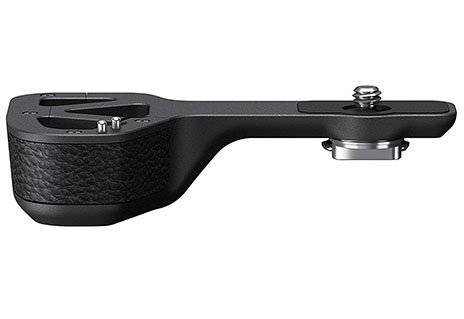
The Sony GP-X1EM increases the height of the built-in grip on the a7 III and gives you somewhere to rest your fingers. The grip is very well made from aluminum and rubber, and it also matches the same color and texture that you will find on the a7 III.
Unfortunately the GP-X1EM does block access to your cameras battery door, so you will need to remove it to change the battery. This isn’t ideal but since the new battery in the a7III lasts so long, it shouldn’t prove to be too much of an inconvenience for many shooters.
Meike MK-X1EM Grip Extension
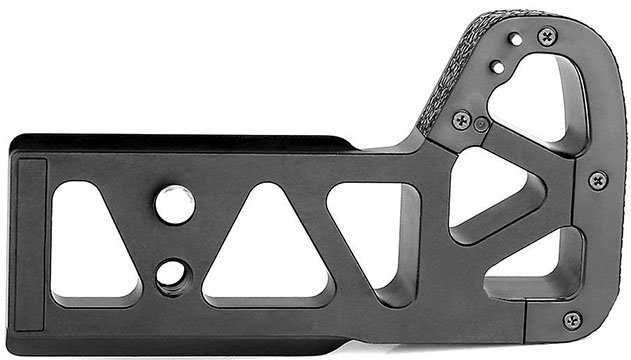
The Meike MK-X1EM is very similar to the Sony GP-X1EM grip, but it costs half of the price. Just like the Sony grip, you will also need to remove the grip to gain access to the battery. There is also a very useful arca swiss plate built into the grip itself, which is something that the Sony grip does not include.
Lennon Gecco LB3 Quick Release Plate Hand Grip Extension

The Lennon Gecco LB3 combines a grip extension and a traditional arca swiss plate. The grip is attached via the a7III’s tripod socket and provides somewhere for you little finger to rest. Both Sony and Meike also offer similar grips but they need to be removed to change the battery. The Lennon grip however also includes an unlock button so that you can change your cameras battery without removing the grip itself.
There is also an additional side plate (Lennon LB2) that can be purchased to turn the grip into an L-bracket.
Price Check & Buyer Reviews for Lennon Gecco LB3
At: Amazon
Price Check & Buyer Reviews for Lennon Gecco LB2
At: Amazon
Screen Protectors
The Sony a7 III has a new touch screen, so you need to be a little careful about which screen protector you put on it. Pick the wrong protector and you might find the touch screen is no longer as responsive as it should be, or even no longer works at all. Thankfully the following screen protectors work perfectly on the a7 III.
Sony PCK-LG1 Screen Protector

Sony’s official screen protector for the a7 III is the PCK-LG1. You’ll find that the PCK-LG1 is labelled as the screen protector for the Sony a9 in many stores, but rest assured this is also supported fully with the a7 III. You can check the compatibility information here on Sony’s website. I’ve been using this screen protector on my a7III since day one. It’s well made and doesn’t affect the touch screen operation at all.
Expert Shield Glass Screen Protector
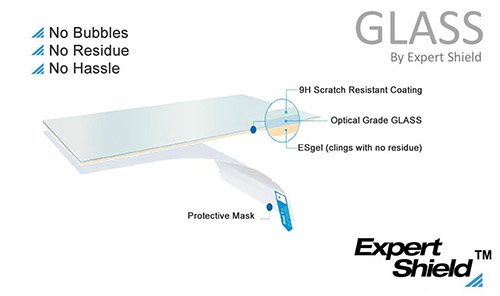
The Expert Shield glass screen protector is made from optical grade glass and hardened it to withstand impact so that it spreads blunt force across its surface and shatters uniformly to protect your camera’s LCD. The screen protector works perfectly with the Sony a7III’s touch screen functions such as touch to focus.
There are also non glass versions of this protector available but they tend to scratch very easily, therefore I recommend going with the glass version. Just be careful when applying it as if you bend it there’s a risk that it might shatter.
Price Check & Buyer Reviews for Expert Shield Screen Protector
At: Amazon
Neck Straps, Wrist Straps & Clips
The neck strap supplied with all of Sony’s Alpha cameras including the a7 III is pretty thin, and I don’t find it to be the most comfortable strap for extended periods of use, especially when using heavier lenses like the FE 100-400mm GM (my review here). I also sometimes like to use a wrist strap, or clip my camera to a belt or rucksack. This is certainly not the most comprehensive list of straps, but I’ve been using Peak Design for quite some time now and can certainly attest to their quality as well as their customer service.
Peak Design Slide / Slide Lite
The Peak Design Slide can be worn as a sling, neck, or shoulder strap. It uses internally-padded nylon webbing has a smooth side that glides over clothing in sling mode and a grippy side that prevents slipping in shoulder mode.

Peak Designs unique Anchor Link system connects quickly with dual connection points to keep your camera more stable than traditional sling straps.
There are two versions of this sling, a full sized version with a strap width of 45mm, and a lite version with a strap width of 32mm. I’ve been using the full sized version of this strap for over a year, but it’s overkill for a mirrorless cameras like the a7 series, so I’d recommend going with the Lite version which I’ve also since picked up and now the full sized version never gets clipped on!
Price Check & Buyer Reviews for Peak Design Slide Lite
At: Peak Design | Amazon | B&H Photo
Peak Design Cuff
The Peak Design Cuff is a great way to protect your camera from accidental drops. It connects to the a7 III via Peak Designs anchor system and the wrist loop magnetically locks in the open position, or comfortably cinches down on your wrist for added security. It took me a little while to get used to the magnetic lock, but now I wouldn’t want to be without this strap.

Price Check & Buyer Reviews for Peak Design Cuff
At: Peak Design | Amazon | B&H Photo
Peak Design Capture Camera Clip
The Capture clip is a secure, convenient, and accessible way to carry your camera. Capture keeps your camera stable while hiking, biking, or moving around anywhere you choose.
Capture includes 2 components: a metal clip that clamps to any backpack strap, belt, or bag, and an Arca tripod-compatible plate that screws into the bottom of your camera. I often use this attached to the strap on my rucksack for quick access whilst hiking, gone are the days when my camera sits in my bag and rarely comes out.
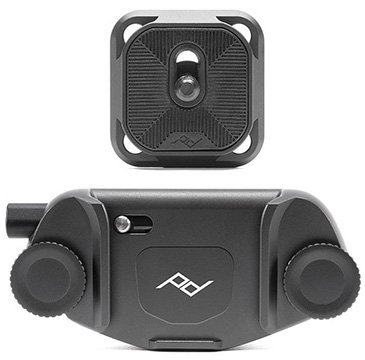
Price Check & Buyer Reviews for Peak Design Capture Camera Clip
At: Peak Design | Amazon | B&H Photo
Cases and Bags
Needless to say, there are thousands of cases and bags that could be used to carry the Sony a7 III. Here I’ve just listed some of the most popular, including the ones that I’m using myself.
Lowepro Adventura TLZ 30 II
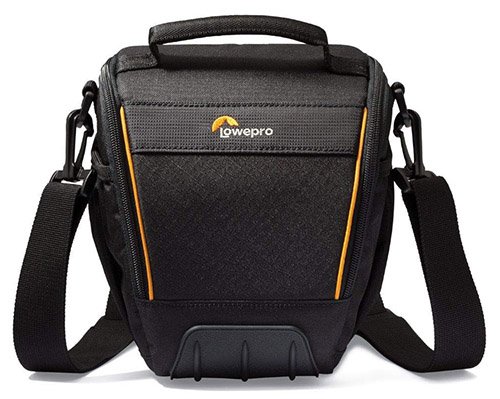
If you are looking for a small case for the a7III then the Lowepro Adventura TLZ 30 II is a great choice. It holds the a7III along with a single lens that is no longer than 120mm.
I’ve tried it with the Sony FE 24-70 F4, FE 16-35 F4, FE 28-70, FE 24mm F1.4 GM, and FE 85mm F1.8 all of which fit comfortably. With the FE 16-35 F2.8 GM it’s a very tight fit.
I’ve also read that it will hold the Sony a7III with the Tamron 28-75mm but it’s a tight fit. I’ve not tried it with the Sony FE 24-105 G lens but since it’s 113.3mm in length it should also fit comfortably.
Think Tank / MindShift Backlight 18L Backpack

I own this bag myself although in the woodland green color and not charcoal grey like pictured above. It’s extremely comfortable and the straps are well padded. I like to use this as my lightweight day pack and it will even fit my Sony FE 200-600 attached to the camera (with lens hood reversed).
You access your camera gear through the rear access panel which you can also access without taking the backpack off by simply rotating the bag to the front of your body while the waist belt is still secured. There’s a dedicated compartment that will fit up to a 13” laptop or tablet, front storage pockets totaling 5L of space and great for any personal gear like a light jacket or food. There’s also a seam-sealed rain cover included. The pack weighs 3.5 lbs. (1.6 kg) and has a total volume of 18 liters.
The exterior dimensions are 10.6” W x 18.5” H x 7.1” D (27 x 47 x 18 cm) so it also meets most international and US carry-on requirements. Internal dimensions are 9.4” W x 16.7” H x 5.5” D (24 x 42.5 x 14 cm).
If 18L is not large enough then there is also a 26L and 36L version available, I also have the 36L myself.
Price Check & Buyer Reviews for MindShift TrailScape 18L Backpack
At: Think Tank | Amazon | B&H Photo
Lowepro ProTactic 450 AW Camera and Laptop Backpack
The Lowepro ProTactic 450 AW is a serious backpack and one of the most popular on the market. There’s plenty of room in here for the a7 Mark 3 and multiple lenses. There’s also space for a 15″ laptop. The straps are well padded and there’s a built-in waterproof cover to keep your gear dry. I don’t own this backpack myself, but after reading the reviews on Amazon I’m thinking that I should!
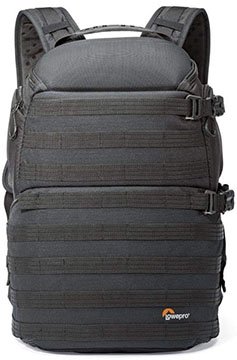
Lowepro Flipside 400AW II Backpack
Another very popular choice with photographers is the Lowepro Flipside 400AW II. Like the ProTactic 450, there’s plenty of room in here for your a7 and 5-6 lenses. There’s also space for a 15″ laptop or tablet. The built-in waterproof cover will keep your gear dry should you find yourself caught out in the rain.
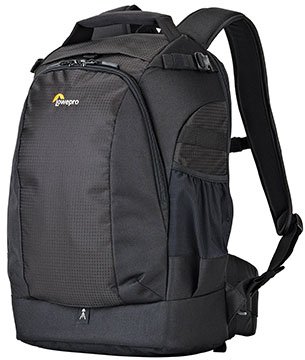
Peak Design Everyday Messenger 13 V2
The Peak Design Everyday Messenger 13 V2 is a serious messenger bag. It features a MagLatch closure, origami-inspired FlexFold dividers, weatherproof expandable protective shell (400D nylon canvas) and hyper-adjusting internally padded seatbelt strap. There are dedicated Peak Design Capture clip attachment points and front access panel. You can easily pack your a7 inside and a couple of lenses with room left for accessories as well as a 13″ laptop.
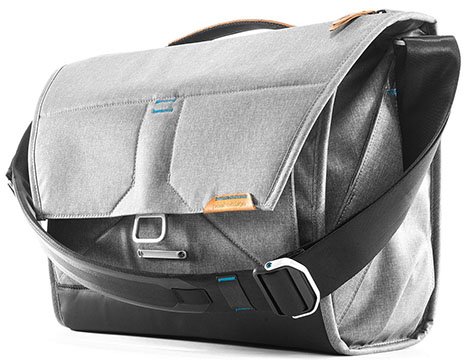
Price Check & Buyer Reviews for Peak Design Everyday Messenger 13 v2
At: Peak Design | Amazon | B&H Photo
Peak Design Everyday Backpack
The Everyday Backpack from Peak Design provides great accessibility, expandability, and organization of your Alpha gear. The MagLatch provides lightning fast top access, and there’s dual side-loading via two weatherproof side zips. Integrated luggage carry makes this bag equally suited for daily commutes and extended travel.
There are internally padded accessory pockets to help keep small items in place and a dedicated sleeve for up to a 15” laptop, tablet, and documents. You also never need to worry about your gear getting wet since it features a weatherproof 400D nylon canvas shell.
I don’t own this bag, but it is definitely on my list for when I win the lottery as it’s not cheap. The Everyday Backpack is available in both 20L and 30L sizes, as well as 4 different colors.
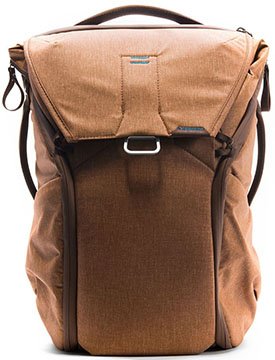
Price Check & Buyer Reviews for Peak Design Everyday Backpack
At: Peak Design | Amazon | B&H Photo
ND and Polarizing Filters
There are many different types of filters that you can use with your Sony a7iii, but two of the most popular are the circular polarizing (CPL) and the natural density (ND) filters. These filters are available as both screw-in type filters that simply screw into the filter thread on your lens, and also slot-in filters that require a filter holder. Attaching a poor quality filter to an expensive lens and camera really makes no sense, so here are some of the best filter options for your a7iii.
Breakthrough X4 Screw-in CPL Filters
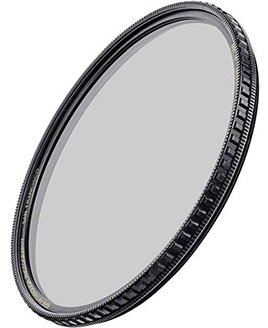
Breakthrough CPL filters are color neutral so there is no color cast that will require removing in post. They are made from SCHOTT Superwhite B270® optical glass. Each side of the glass is then treated with eight layers of Breakthrough Photography’s proprietary nanotec® and MRC (multi-resistant coatings) optical coatings which cause dirt and moisture to essentially slide right off of the glass itself. You won’t need to look too far to find glowing reviews of these filters.
Price Check & Buyer Reviews for Breakthrough X4 CPL
At: Amazon
Breakthrough X2 Screw-in ND Filters
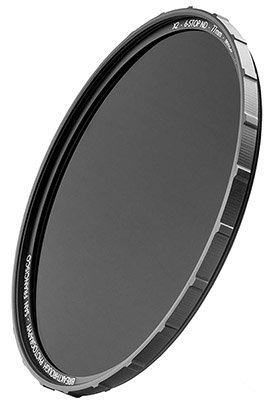
Just like their CPL filter, the Breakthrough X2 ND filters are color neutral so there is no color cast that will require removing in post. The X2 ND features critically sharp H-K9L optical glass made in Japan, and incorporates their MRC8 to eliminate unwanted glare and ghosting. MRC8 is structurally harder than the glass itself, providing a protective scratch-resistant layer, shielding the glass from the elements. There is a 25-year guarantee included.
Price Check & Buyer Reviews for Breakthrough X2 ND
At: Amazon
Breakthrough X4 Screw-in ND Filters
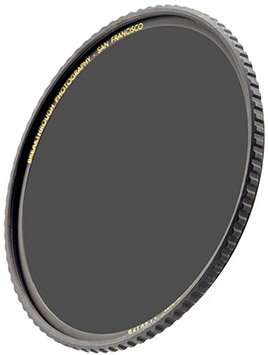
A step up in quality from the X2 ND filters, the X4 filters features SCHOTT Superwhite B270® optical glass, which is an ultra clear crown glass. There are 16 layers of multicoating (8 per side with the outer being hydrophobic) compared with 8 layers for the X2. The X4 incorporates state-of-the-art nanotec® Nano Coatings Technology, which beads water and other elements rather than absorbing and smearing. There is a 25-year guarantee included.
Price Check & Buyer Reviews for Breakthrough X4 ND
At: Amazon
Waterproof Housing
If you are looking to use your Sony a7 III underwater then you will need to invest in a waterproof housing. There are a few options on the market, but you can’t go wrong with the following:
Nauticam NA-A7III Underwater Housing
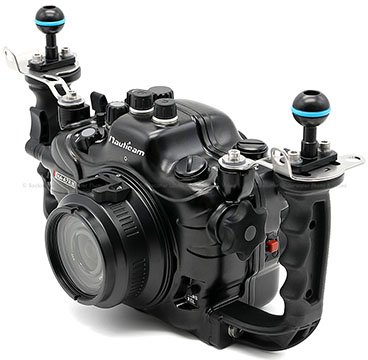
The Nauticam NA-A7III is probably the best waterproof housing that money can buy. If you need to dive down to up to 100m, then this is the housing for you. Full details can be found on Nauticams website.
Price Check & Buyer Reviews for Nauticam A7III Housing
At: Nauticam
Ikelite 200DL Underwater Housing for Sony Alpha A7 III
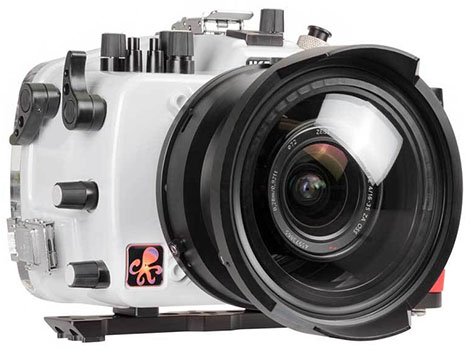
If the Nauticam is too expensive, then the Ikelite will save you around $500. But if you read around on the web, you will find that most underwater shooters prefer the Nauticam. Full details on Ikelite’s website.
External Flashes, Radio Receivers and Commanders
The Sony a7 III does not include a built-in flash, so your only option is to go external, but don’t worry as there are plenty of options to choose from.
Sony HVL-F45RM
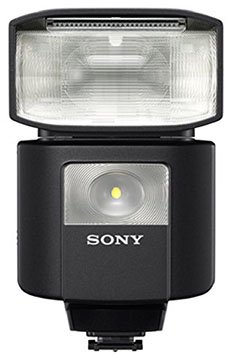
The HVL-F45RM is a compact flash packed with plenty of features. Like the a7 III it’s dust and moisture resistant, so no need to worry if the weather takes a turn for the worse. The head can be rotated 180° and tilted up to 120°. The flash is pretty powerful and offers 45m/148’ (ISO 100) and a range of 24mm to 105mm.
It has a built-in wireless radio-controlled system, and can be used as either a commander or receiver. As a commander you can connect up to 15 compatible flashes or receivers in up to 5 groups. Full details can be found on Sony’s website.
Sony HVL-F60RM
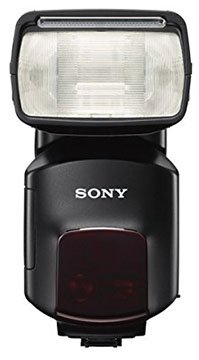
Sony’s flagship flash is the HVL-F60RM. More powerful than the HVL-F45RM, if you simply want a top-of-the-range flash and money is no object, then this is it. Full details can be found on Sony’s website.
Godox VING V860IIS TTL
If the price of the Sony flash units leaves you in tears, then you can dry your eyes now as the Godox VING V860IIS TTL is a much more affordable flash option for your a7 III. If you read the reviews on Amazon you certainly won’t find too many disappointed customers.
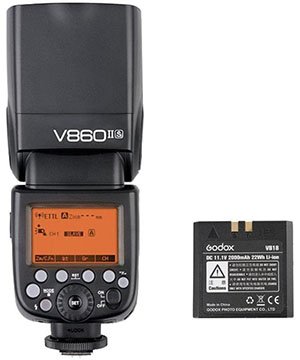
Sony FA-WRC1M Wireless Radio Commander
You can use the FA-WRC1M to connect up to 15 wireless receivers (FA-WRR1) for radio wireless flash control. You can also control existing flash units like the HVL-F60M, F45RM, F43M or F32M over a range of up to 30 m (98.4 ft.). For details on how this works I recommend taking a look at Sony Ambassador Mark Galer’s article.
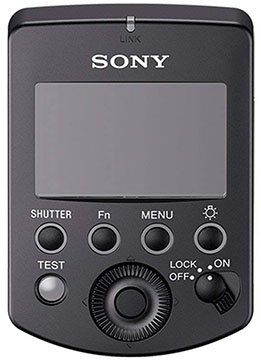
Sony FA-WRR1 Wireless Radio Receiver
You can pair a maximum of up to 15 FA-WRR1 receivers with the FA-WRC1M commander. Full details on Sony’s website.
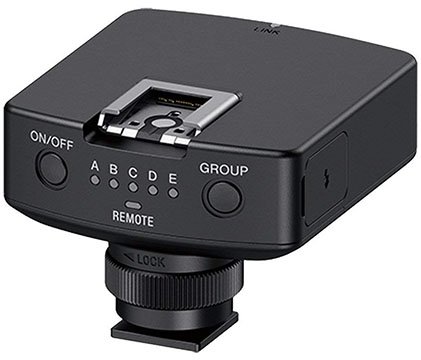
Lens Adapters
There are far too many lens adapters on the market for this article, so I’ll be writing a complete guide to e-mount lens adapters very soon. Until then, here are some of the most popular e-mount lens adapters that can be used on the Sony a7 III.
Sony A-Mount to Sony E-Mount Lens Adapters
For adapting Sony A-mount lenses to the a7III there are three adapters to choose from. For a full comparison of these lens adapters I’d recommend checking this Sony Article.
Sony LA-EA5 Lens Mount Adapter
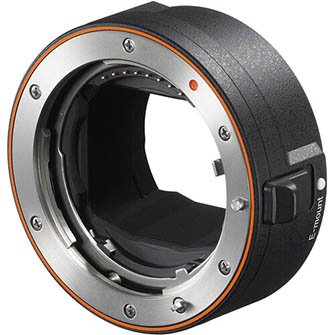
The LA-EA5 is Sony’s newest A-mount to E-mount adapter. The LA-EA5 adapter provides autofocus support for Sony A-mount SSM (Super Sonic wave Motor) lenses, SAM (Smooth Autofocus Motor) lenses, and even non-motorized screw-drive lenses (currently limited to the a7R IV and a6600 only) in still shooting modes.
Sony LA-EA4 Lens Mount Adapter
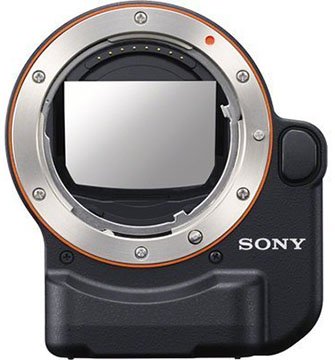
The LA-EA4 A-Mount to E-Mount Lens Adapter enables you to attach most A-mount lenses to an E-mount full-frame digital camera body like the a7R IV. The adapter features a built-in AF motor, aperture-drive mechanism and Translucent Mirror Technology to enable full-time, continuous, TTL phase-detection autofocus. AF is supported with all A-mount lenses except STF models, and auto exposure will be enabled with all compatible lenses. Teleconverters and Minolta XI lenses are not compatible.
Sony LA-EA3 Lens Mount Adapter
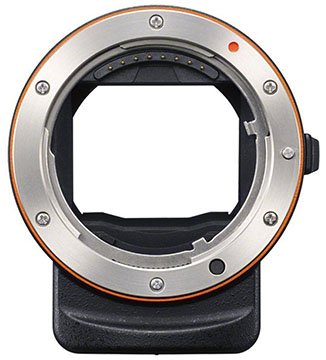
The LA-EA3 A-Mount to E-Mount Lens Adapter enables you to attach most A-mount lens to an E-mount full-frame camera body. It supports Auto Exposure (AE) and features an aperture mechanism. Unlike the LA-EA4 adapter, this does not include the AF motor.
Canon EF to Sony E-Mount Lens Adapters
If you wish to adapt Canon EF mount lenses to Sony E-mount cameras then the following adapters are two of your best choices:
Metabones Canon EF/EF-S T Smart Adapter
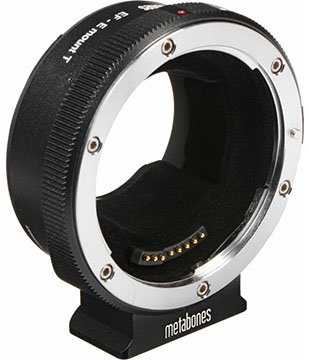
The Metabones adapter lets you mount Canon EF/EF-S lenses to Sony E-mount cameras like the a7 Mark 3. It retains electronic communication between the camera and lens to provide automatic aperture control, EXIF data, image stabilization and autofocus. Metabones regularly update the firmware that helps to improve AF performance with many Canon EF lenses.
Sigma MC-11 Mount Converter
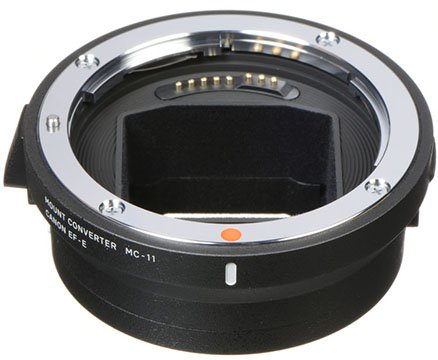
The MC-11 Mount Converter enables the use of Sigma EF-mount lenses on Sony E-mount camera bodies. It supports autofocus and auto-exposure, as well as in-camera image stabilization and full EXIF data transfer.
Sigma has a lens compatibility list for this adapter, but many Canon lenses also work very well although not on their list. I’d recommend a quick Google search to see which lenses people are successfully using in the forums.
Nikon F to Sony E-Mount Adapters
If you want to adapt Nikon F mount lenses to Sony E-mount, then there’s one adapter that you might want to consider.
Monster Adapter LA-FE1 Magic Ring
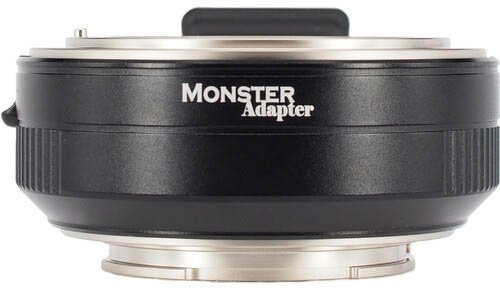
The Monster Adapter LA-FE1 Magic Ring adds autofocus support to Nikon AF-I, AF-S and AF-P lenses when used with the Sony a7III.
For lenses that are fully supported, the adapter will drive both electromagnetic and mechanical lever aperture diaphragms. Fully-manual lenses and screw-drive lenses don’t get any sort of focus or aperture control, but the adapter will work passively with them.
The adapter will work together with lens stabilization when available and also works together with Sony’s in-body stabilization (IBIS).
The adapter also supports Sony’s Human and Animal Eye-AF, as well as high-speed continuous shooting (up to 10 frames per second on compatible cameras).
Price Check & Buyer Reviews for Monster Adapter LA-FE1 Magic Ring
At: Amazon | B&H Photo
Remote Controls
If you want to reduce camera shake or take long exposures in bulb mode, then a remote control is a very handy device to have in your bag.
Sony RMT-P1BT Remote Commander

The Sony RMT-P1BT Remote Commander is the newest remote control option for the Sony a7III. The RMT-P1BT operates using Bluetooth connectivity which provides a reliable connection even in bright sunlight or when there are obstacles between the commander and the a7III. In my own tests the RMT-P1BT remote works reliably up to around 18m or 60 feet away from the camera, and this is the case whether you are behind or in front or the camera, indoors or outdoors.
It features a fast 0.05 seconds release time and an external LED that flashes or lights continuously to show shutter, movie recording and AF status. The remote covers essential camera controls including releasing the shutter, a focus button, a lock switch that prevents accidental operation during transport, movie recording start/stop and power/digital zoom. There are also two custom buttons that mirror the functions of the C1 and AF-ON buttons on the camera body.
When the Bluetooth Remote option is enabled in the a7III settings, the Location Info. Link is disabled. So if you are using Imaging Edge Mobile to record your location information via bluetooth, I’m afraid this will not work at the same time as the remote.
Unlike the older RMT-DSLR2 remote, the RMT-P1BT also supports burst shooting. So when you are in continuous shooting mode, you can hold down the shutter button to shoot continuously.
Please note that this remote is only supported if you have updated the Sony a7III firmware to version 3.00 or later.
I’ve created a short video guide on how to setup and use the Sony RMT-P1BT remote commander.
Sony RMT-DSLR2 Wireless Remote Commander
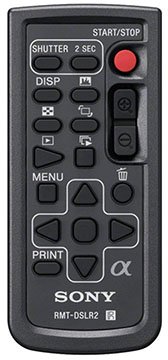
Another wireless remote control option for the a7 III is the Sony RMT-DSLR2. It uses infrared communication and is pretty reliable. However, it rarely works well from behind the camera when outdoors, but works perfectly indoors from behind with a range of around 5-6 meters (18-20 feet) away from the camera. It will also work outdoors with the same range when you are in front of the camera, and a range of 3-4 meters (10-13 feet) to the side of the camera.
As well as letting you control your shutter for long exposure in bulb mode, it also lets you to control other aspects of the camera. You can access and change menu/settings, start and stop video recording via the ‘start/stop’ button, and remotely review photos, delete photos, or even send photos to your printer if you have this setup. It doesn’t however work when burst shooting, so if you are in any of the continuous shooting modes then it only fires the shutter once.
You will need to enable the IR Remote Ctrl option on page 3 of the setup menu for this remote to work.
Sony RM-VPR1 Remote Commander
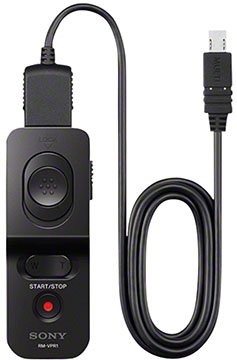
The RM-VPR1 is the remote that I’m using myself. It connects via cable to the multi-terminal on your a7 III. There’s a shutter release button which can also be locked on, a video recording start and stop button, as well a zoom control rocker switch. The remote works exactly as intended and I pretty much always have it in my bag.
Intervalometers
An intervalometer is a device that plugs into a camera and controls how often, how long and how many shots are taken, they are widely used for time-lapse photography.
With Sony a7III firmware 3.01 and newer an interval shooting has now been added in-camera, so you don’t really need an external remote any more.
But if you would still prefer to use a remote, then the Pixel TW-283 is a good choice.
Pixel TW-283
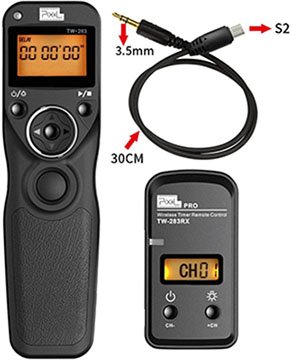
The Pixel TW-283 not only works as a remote control, it also works as an intervalometer, and best of all it has a range of around 80 meters. With the intervalometer mode you can select the initial delay, exposure duration, the interval time, number of shots to take, interval repeat time and the number of cycles. The Pixel TW-283 includes both a remote and a receiver unit. The receiver can be attached to the hot-shoe of the a7 III, it then connects via Micro USB cable.
Price Check & Buyer Reviews for Pixel TW-283
At: Amazon
Microphones
If you enjoy making videos, then you will probably want to invest in a better microphone than the built-in stereo microphone found inside the a7 M3. Here are just some of the most popular microphones that Alpha Shooters are using today.
Rode VideoMic Pro R

The Rode VideoMic Pro R is a very popular shotgun microphone which also includes Rycote’s Lyre suspension system to isolate your microphone from vibrations or rumbling when operating the camera. It connects to the camera directly using the 3.5mm input and provides a dual mono signal. I picked up one of these myself recently for my new YouTube Channel.
Rode VideoMicro

If the Rode VideoMic Pro+ is a little too expensive then the Rode VideoMicro is a great alternative that you might want to consider. It’s much smaller and lighter than the Pro+ version and it does not require an additional battery, you simply connect it through the mic port on the a7III and you are ready to go.
Rode Wireless Go
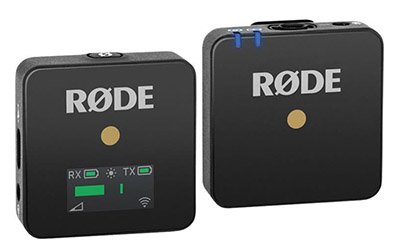
Rode’s latest audio recording system is the Wireless GO. It features a very compact design and offers a simple receiver and transmitter with microphone built in. The two-piece set simplifies the setup process by clipping the transmitter-microphone combo to your subject then connecting the receiver to the a7III.
The Wireless GO uses an internal lithium-ion battery that Rode claims will last up to seven hours. Charging is done to both transmitter and receiver via USB-C ports and it can be fully recharged in two hours. The transmitter has a built-in pre-polarized omnidirectional microphone with a frequency range of 50 Hz to 20 kHz and weighs just one ounce. It also has a 3.5mm TRS powered port to support a lavalier microphone. The Wireless GO can transmit up to 230 feet and uses the same 2.4 GHz frequency band as the RodeLink.
This is my preferred microphone for my YouTube videos.
Rode RodeLink Wireless Filmmaker kit
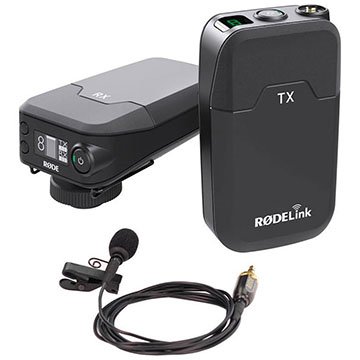
The RODELink Filmmaker Kit provides everything you need to record audio wirelessly, including a receiver, transmitter and lavalier microphone. The receiver features an OLED display with information on level, battery status (receiver and transmitter), mute and channel selection.
The unit can be mounted on the a7 III hot shoe mount, a 3/8 inch thread or belt-clip. The lightweight transmitter can be fitted to a belt or clothing and features a locking thread to ensure the microphone connection is as secure as possible.
Sony XLR-K2M XLR Adapter Kit with Microphone
The XLR-K2M Kit features two professional standard XLR inputs with independent level controls, and includes an ECM-XM1 shotgun microphone.
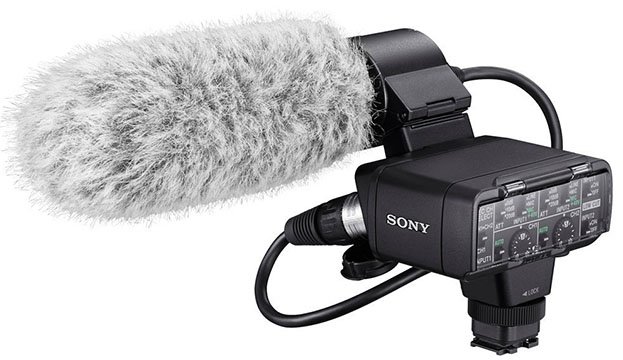
Sony ECM-XYST1M Stereo Microphone
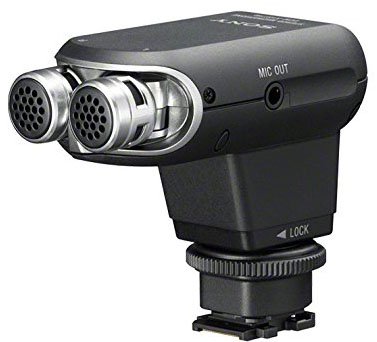
With the ECM-XYST1M the directional angle of the microphones can be adjusted from 0° to 120°, allowing you to fine-tune your audio capture with precision. An included windscreen enhances audio-quality further by cutting down on wind noise.
Tripods and Monopods
One of the reasons that many photographers switch to the Sony Mirrorless System and a camera like the a7III is to save weight. A lighter and small camera also means that you no longer need the largest and heaviest tripod on the market to stabilize your camera. As you most likely already know, there are thousands of tripods on the market to choose from. Here are just a few of my recommendations including the ones that I’m using myself.
Peak Design Travel Travel Tripod Carbon

The Peak Design Travel tripod raised over $12 million on Kickstarter in 2019, largely due to its unique compact design and Peak Designs reputation for building high quality products.
There are two versions of this tripod available, a carbon model that weighs 1.27 kg (2.81 lbs.), and the aluminum model that weights 1.56 kg (3.44 lbs.). Both versions have a maximum weight capacity of 9.1 kg (20 lbs.) so you can even use this tripod with telephoto lenses.
The tripod features a very compact form factor and 5 section quick release legs that deploy in seconds without having to flip over like traditional travel tripod legs.
There’s an omnidirectional ergonomic ball head included that is compatible with all PD plates and most 3rd party Arca-type plates.
When collapsed the tripod measures 39.1 cm (15.4”) in length and 7.9 cm (3.125″) in diameter. The maximum height (center column raised) is 152.4 cm (60″), or 130.2 cm (51.25″) with the center column down. The minimum height (low mode) is 14 cm (5.5”).
The following accessories and tips video provides a lot more details on this unique tripod:
So far I’ve resisted the temptation to order this tripod myself, but I don’t think I’m going to be able to resist it for much longer.
Price Check & Buyer Reviews: Peak Design Travel Travel Tripod
At: Peak Design | Amazon | B&H Photo
Sirui W-2204 Waterproof Tripod
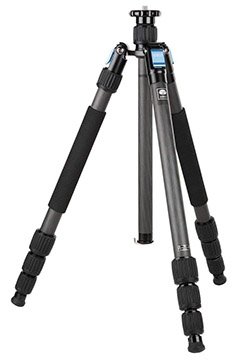
I’ve been using the Sirui W-2204 4 section carbon fiber tripod for a couple of years now and can’t really fault it for the price. The rubber twist locks are rock solid and I’ve never had one comes loose on me, they are also waterproof and dust proof. I’ve used mine in rivers and along the coast and it’s still going strong. It includes both rubber feet and stainless steel spikes for securing it to softer ground.
There’s an integrated monopod too which comes in handy at times. The center column can be split up, its height can be adjusted and it is also reversible, meaning that all shooting positions are possible. The flexibility of the center column allows ground-level shots to be taken as well as allowing the total height of the tripod to be increased.
The aluminum head support plate is fitted with a set screw to secure the head and the head mounting screw quickly switches from 1/4″ to 3/8″. There’s a carabiner hook too for adding extra weight for additional stability. It weighs 1.76kg and supports a maximum weight of 18kg. Maximum height is 1782mm and it folds down to 560mm.
Gitzo Mountaineer Series 3, 3 Section Tripod (GT3532)
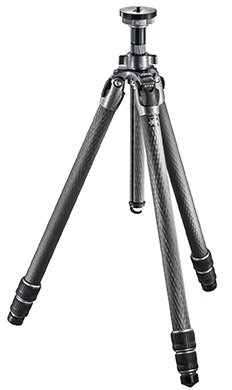
If money is no object and you only want the best then it’s hard to go wrong with a Gitzo tripod. I don’t own one myself but would very much like to. Gitzo offer a wide range of tripods but if I were buying one I’d probably go for their Mountaineer Series 3 tripod for my a7III.
The Gitzo GT3532 is a standard-height, 3-section, Series 3 carbon fiber tripod that weighs just 1.88 k, supports a maximum weight of 21 kg and reaches a maximum height of 161 cm and a minimum height of 64 cm. The tripod’s rapid center column is easily removed, transforming it into a ground level tripod, it also has a reversible column mechanism.
The Gitzo GT3532 three-section legs are secured by G-lock Ultra twist locks, with a built-in O-ring that keeps dirt and dust out of the leg mechanism. The tripod features a stabilizer hook on its center column to add weight and increase stability when required. Its removable feet enable it to change and adapt to any type of surface.
A wide array of heads and other accessories can easily be added via the 1/4″ and 3/8″ attachment on the upper disc.
Really Right Stuff TVC-33 MK2 / TFC-33 MK2 Tripods
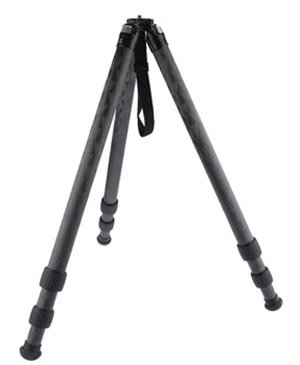
Just like Gitzo, RRS tripods are not cheap but you get what you pay for. There are many to choose from but if I was to splash out on one it would probably be the RRS TVC-33 MK2 / TFC-33 MK2 3 leg carbon fiber tripod. The TVC-33 Mk2 is their standard-height Versa Series 3 tripod. Weighing 4.3 pounds yet capable of supporting 50 pounds.
The TFC-33 Mk2 has all the features of the TVC-33 but swaps the Versa apex for a fixed apex. The fixed apex cannot be used with accessories like a quick-column but packs smaller in diameter that the TVC-33. Both versions have a maximum height of 58.6″ / 149cm and a minimum height of 4.1″ / 104mm.
Price Check & Buyer Reviews for Really Right Stuff Tripods
At: Really Right Stuff | B&H Photo
Manfrotto MT055XPRO3 055 Aluminum 3-Section Tripod
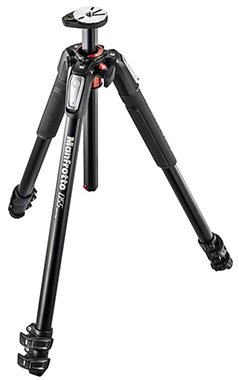
If the price of the previous 3 tripods is a little too steep, then the Manfrotto MT055XPRO3 3-section aluminum tripod might be just what you are looking for.
The main feature of the 055XPRO3 is its 90°centre column mechanism, which allows the column to be extended vertically or horizontally to open up a wide range of photography and video applications. It weighs 2.5kg, supports a maximum load of 9kg, extends to a maximum height of 170cm and folds down to just 61cm.
Manfrotto Befree Advanced Alpha Travel Tripod
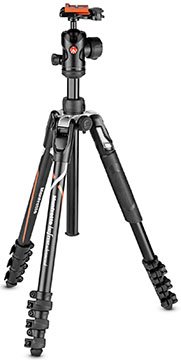
The Manfrotto Befree Advanced Alpha travel tripod is a special version of the Befree Advanced Lever dedicated to Sony Alpha Shooters. The plate is designed to match Sony a7III camera body to ensure perfect grip, even in the most angled camera shots. The front jut of the plate physically blocks the camera, preventing any play both on tilt and rotational movements, always keeping the camera stuck to the head plate.
The tripod weighs 1590g / 3.5lb, supports a payload of up to 8kg / 17.6lb, has a minimum height of 40cm and a maximum height of 151cm or 128cm with the center column down. It’s not been on the market for very long, but early reviews look positive.
Sirui T-025SK Carbon Fiber Travel Tripod with Ball Head

Although I don’t own the Sirui T-025SK I do own its predecessor the Sirui T-025x. I was previously using the MeFOTO RoadTrip for my travel tripod until a friend showed me his T-025x and I was blown away by how much smaller and lighter this was than the RoadTrip.
The Sirui T-025SK is very similar to the Sirui T-025x. It’s made from carbon/magnesium, has 5 leg sections with 4 twist locks and includes the B-00 ball head. It collapses down to 34cm with the head attached or 30cm without, and weighs just 1 kg / 2.2 lbs. with the head. It’s capable of supporting loads of up to 5kg / 11 lb. It extends to a maximum height of 130cm with the center column or 95cm without, and will drop down to as low as 17cm without the center column with the ball head on or 10cm with the ball head off. There’s a handy carabiner for attaching a rucksack to add stability as well.
The Sirui T-025SK is available in the US and many other countries but it doesn’t appear to be available in the UK at this time. But you can still purchase its predecessor the Sirui T-025x which I own myself. The Sirui T-025x includes the C-10S ball head, collapses to just 30cm with the head attached, and weighs just 0.88kg / 1.94lb with the head.
It’s capable of supporting loads of up to 6kg / 13.2 lb. It extends to a maximum height of 130cm with the center column or 95cm without, and will drop down to as low as 17cm without the center column with the ball head on or 10cm with the ball head off. There’s also a handy carabiner for attaching a rucksack or weights to add additional stability.
MeFOTO RoadTrip Travel Tripod
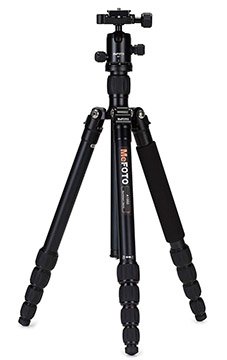
The MeFOTO RoadTrip is a great travel tripod for the Sony a7III. I’ve owned one for over 2 years until I replaced it with the Sirui T-025x. It’s only 39.1 cm when folded but extends to 156.46 cm, it weighs 1.63kg / 3.6lb and can support up to 7.98kg / 17.6lb. It comes with a precision matched Q series ballhead and Arca-Swiss style compatibility quick release plate with integral bubble level.
This tripod is built like a rock and receives glowing reviews, I only replaced mine because I was looking for something a little smaller and lighter, otherwise I would have most definitely held on to it.
Sirui P-326 6 Section Carbon Fiber Monopod
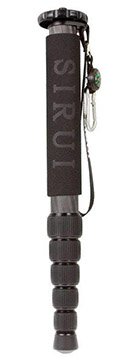
If you are looking for a lightweight yet sturdy monopod for your Sony a7III then look no further than the Sirui P-326. I’ve had this monopod for a couple of years now and would be lost without it.
Its constructed of 6 carbon fiber sections, a non-slip rubber foot with fully retractable metal spike and it also includes a wrist strap. The head features a reversible 1/4″ & 3/8″ screw for tripod heads and cameras.
It extends to a maximum height of 1550mm and collapses down to 392mm. It weighs only 0.45kg and supports a maximum weight of 10kg.
Cages
A cage is an open metal casing for your Sony a7III with multiple female screw threads for attaching a wide range of accessories. This effectively is the first step in creating a modular video rig setup. There are a few on the market, here are the two most popular.
SmallRig Cage 2087
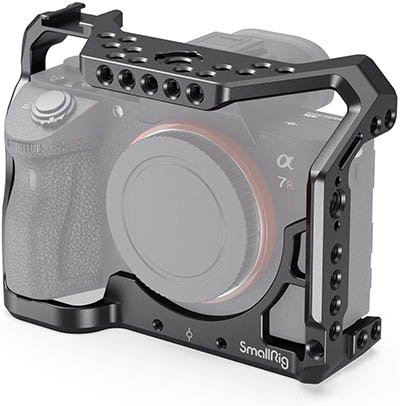
The SmallRig 2087 Cage is designed exclusively for the Sony a7III and a7R III. The cage is equipped with an eyelet for the wrist strap on the top and an integrated cold shoe. The cage is equipped with an abundance of 1/4’’ and 3/8’’ threaded holes. When mounted the cage does not block the cameras buttons, ports or battery compartment.
8Sinn Sony a7 III Cage
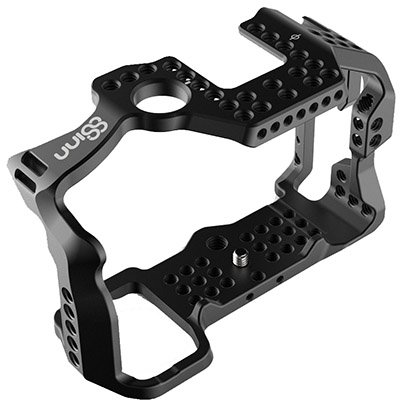
The 8Sinn Cage for Sony a7III is a CNC Machined, anodized aluminum full-armored cage with integrated accessory mounting holes. The cage is designed for the Sony a7III and a7R III cameras and features a built-in cold shoe as well as slots for a hand strap.
Threaded 1/4″-20, 3/8″-16, and M4 mounting holes allow you to mount accessories.. You can still access all of the cameras buttons and dials, as well as the battery and media doors with the cage in place. An included HDMI cable clamp mounts on the side of the cage and is adjustable to fit your HDMI cable.
Gimbals & Stabilizing Rigs
The IBIS in the a7 III does a great job at stabilizing stills and video, but if you want the silkiest and smoothest videos possible, then you are going to need a gimbal.
Zhiyun Crane Plus
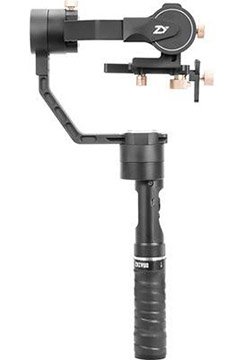
I’ve recently bought the Zhiyun-Tech Crane Plus myself and it works perfectly with the Sony a7III. The Crane Plus introduces follow focus control, an intuitive way for you to control focus during your shoots. There’s a newly designed PoV (Point of View) mode that allows for additional camera movement by providing up to 45 degrees of synchronous motion on the roll axis.
What this means is that rather than Crane Plus keeping the camera level when you roll left or right, PoV mode will move with you and roll your camera left or right, up to 45 degrees. Even simpler, when you move, your camera moves with you. The Crane Plus can handle a weight capacity of up to 2.5kg (5.51 lbs.).
Zhiyun Crane 2
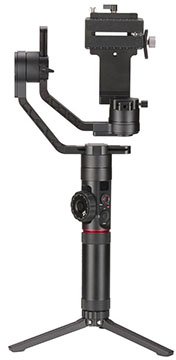
Not to be confused with the Crane v2 (Zhiyun product names are very confusing), the Zhiyun-Tech Crane 2 is a 3-axis handheld gimbal stabilizer offering 360° rotation along all three axes. The Crane 2 introduces follow focus control, an intuitive way for you to control focus during your shoots.
Additionally, the maximum payload weight is 3.2kg / 7 lbs. There’s also an OLED screen that displays camera and stabilizer settings. Other features include a Manfrotto standard quick release plate for rapid camera mounting and a slow-fall function which protects your camera from sudden drops that may occur once the gimbal is powered down.
Zhiyun Weebill Lab
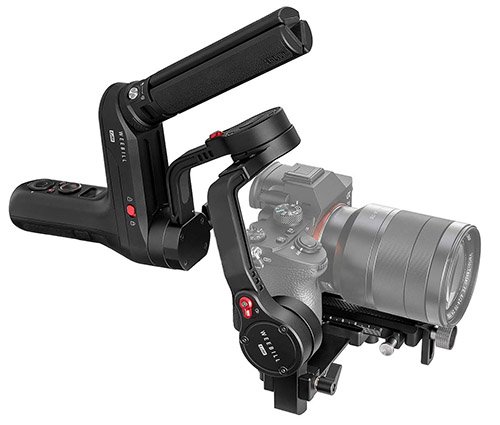
The Zhiyun-Tech WEEBILL LAB has added support for a mini tripod in the upper section of the gimbal, allowing for two-handed operation as well as easily switching to underslung mode. At the same time, Zhiyun has shortened the main handle to make the gimbal more compact and lighter.
The WEEBILL LAB supports up to 3kg / 6.6 lb and offers pan follow, full follow, locking, POV, vortex, and PhoneGo modes with 360° pan, tilt, and roll rotation.
DJI Ronin-S
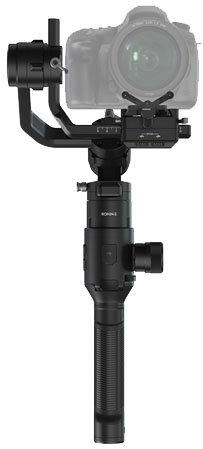
The DJI Ronin-S is 3-axis gimbal that supports up to 3.6 kg / 7.94 lb. Reviews look very positive, but it currently sells for around $100 more than the Zhiyun Crane 2.
DJI Ronin-SC
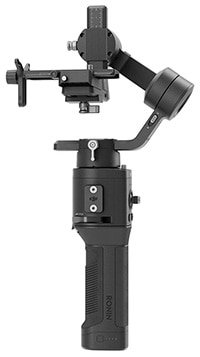
The DJI Ronin-SC is 3-axis gimbal that is tailor made for mirrorless cameras like the Sony a7iii. It has a net weight of only 1.1 kg, making it extremely portable and ideal for travelling, yet it still supports a maximum payload of 2kg.
HDMI Recorders and Monitors
There are times when shooting video that a larger monitor makes life so much easier, and sometimes an additional recorder can be useful to eliminate your camera’s internal compression and time recording limits. On the a7III you can only record video for a maximum of 30 minutes before you need to create a new recording, with an external recorder you can record for hours.
Atomos Ninja V
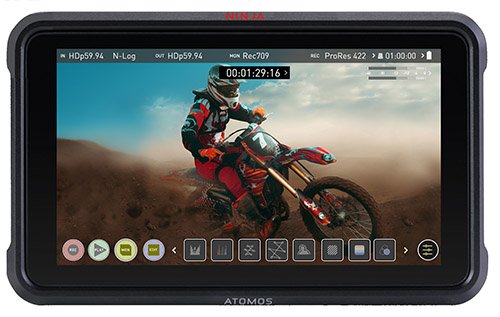
The Ninja V displays 10+ stops of dynamic range in realtime from Log/ PQ/HLG signals. This helps you to see your images clearly in bright daylight on the near edge-to-edge anti-reflection screen. You can also eliminate your camera’s internal compression and time limits and record 4K HDR video direct from the a7III over HDMI 2.0.
With an 1TB AtomX SSDmini (sold separately) you can achieve up to 150 minutes of 4K recording on a single drive! It supports both ProRes and DNxHR recording formats.
I recently picked up a Ninja V myself and have been using it to record the viewfinder output from my Sony cameras, mainly for YouTube videos. My only complaint is that the fan is a little noisy and is picked up by the microphone far too easily.
Sony CLM-FHD5
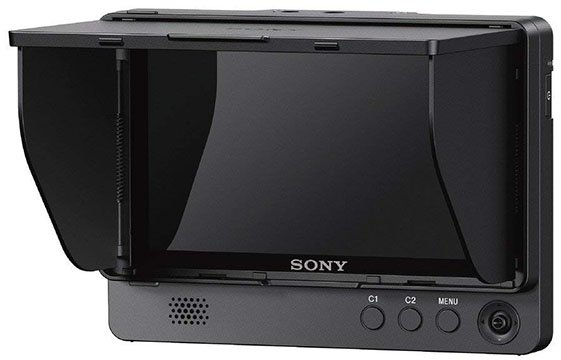
The CLM-FHD5 features a native resolution of 1920 x 1080 and an HDMI input to display the full HD signal out of your a7 III. The 5″ display features enlarging and peaking for precise focusing, false color and video level marker for exposure adjustment assistance, and S-Log display. It supports W, M, and V-type batteries, and also supports an optional AC power adapter.
The monitor includes a hot shoe mount and sun hood that protects the monitor from glare. There is no recording option, this is purely for display only.
Tethering Cables
If you want to tether your a7III to a display, then you’ll want a good quality USB Type-C cable.
Tether Tools TetherPro
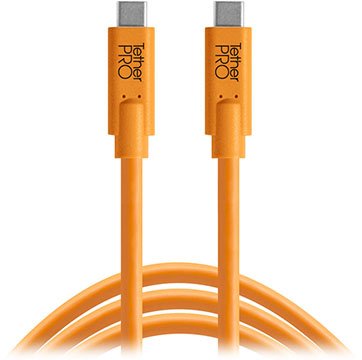
Tether Tools offer some of the best tethering cables on the market, and their new USB-C tethering cables are a great match for the Sony a7 III.
Camera & Sensor Cleaning
Unless you want to spend ages faffing around in Photoshop to remove lens or sensor dust, it really is worthwhile trying to keep your gear clean. Since the sensor in the a7 III is exposed every time you change a lens, it won’t take long before it picks up some dust particles. However, you are unlikely to see these spots in your shots when shooting wide open, but if you step down to f/11 or higher they will soon become visible. Here are the tools that I recommend to keep your gear clean and shots blemish free.
Rocket Air Blaster Large

If you don’t already have a Rocket Air Blaster in your bag then this should definitely be your first purchase. It’s great for blowing dust off lenses and from your sensor. Mine goes with me everywhere.
VSGO Full-Frame Sensor Cleaning Kit
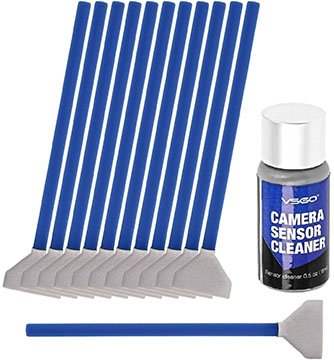
There’s really no need to send your a7 III off to get the sensor cleaned, with this kit you can easily and safely do it yourself for a fraction of the price. Before you start, shoot a piece of white paper with the aperture set at f/22 or higher, this will show you exactly where the dust is located on the sensor.
Price Check & Buyer Reviews for VSGO Full-Frame Sensor Cleaning Kit
At: Amazon
Microfiber Cleaning Cloths
Very soft and lint free microfiber cleaning clothes are definitely as essential item for any photographer, you can never have too many of these.
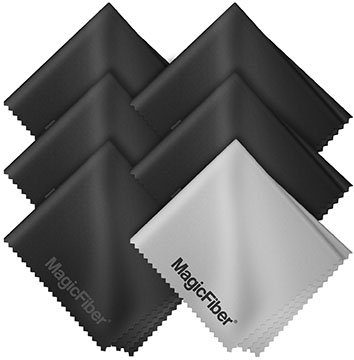
Check Price & Buyer Reviews: MagicFiber Microfiber Cleaning Cloths
At: Amazon
Care Touch Lens Cleaning Wipes
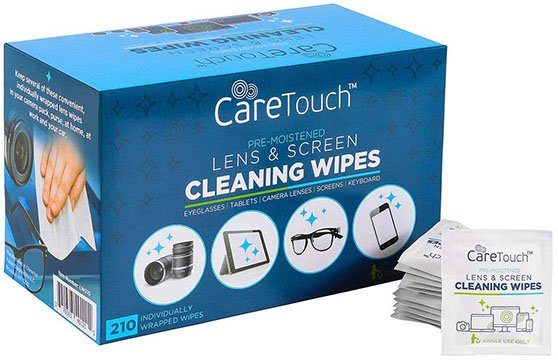
Some good quality lens cleaning wipes are vital if you want to keep your glass blemish free. They are also useful for cleaning your cameras body, LCD screen, as well as any filters you may have.
Price Check & Buyer Reviews for Care Touch Lens Cleaning Wipes
At: Amazon
Replacement Parts
There are a handful of parts on the a7 III that you can easily replace yourself, these include:
Sony FDAEP18 Eyepiece Cup
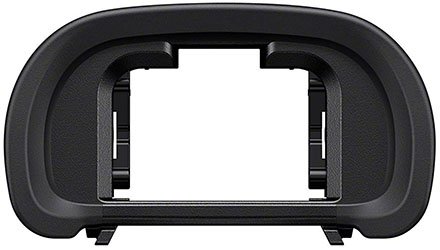
The eyepiece helps to keep out external light to enhance the clarity when using the viewfinder. If you lose yours, it’s very easy to replace.
Sony ALC-B1EM Replacement Body Lens Cap
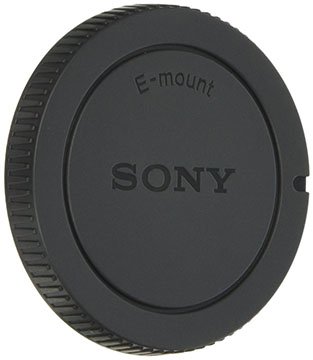
If you have lost your a7 III lens cap then you’ll be glad to know that the replacement is very cheap. It’s always handy to have one of these spare too.
Sony FA-SHC1M Multi Interface Shoe Cap
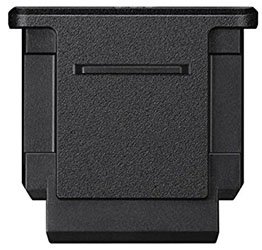
It’s important to keep the multi interface hot shoe cap in place to protect the electrical contacts, as if these get wet there’s a risk of shorting out your camera. I know it’s a very small accessory and far too easy to lose, so make sure you have at least one spare.
Storage and Backups
There are many different storage and backup solutions, here are the ones that I’m using myself.
Samsung T5
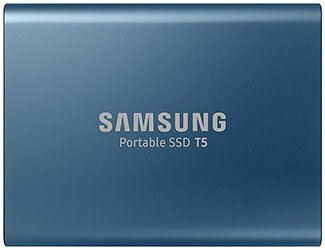
The Samsung T5 is a tiny portable SSD drive. It’s available in 250GB, 500GB, 1TB and 2TB capacities. I use this as a short-term storage solution. It’s my primary backup device whilst travelling, and I also use it to work on files at home before backing them up to my Synology box.
Synology DiskStation DS220+
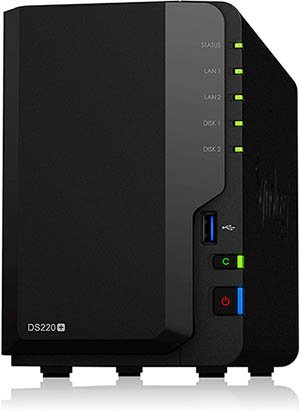
The Synology DS220+ replaces the DS218+ which I’ve been using for a few years now and couldn’t be happier with it.
It’s a Network Attached Storage device that supports two drives in a RAID 1 configuration. These can be either 3.5″ SATA HDD (max 16TB each) or 2.5″ SATA SSD (max 3.84TB each) drives.
You can also configure the DS220+ to sync all of your files with various cloud storage platforms. Full details can be found on Synology’s website.
Cloud Backup

Unless you have a very slow internet connection, backing up all of your photos to the cloud is really a no brainer. I’m using DropBox which syncs nicely with my Synology DS218+. But other options include Microsoft OneDrive, Google Drive, Amazon Drive and Box.
Sony A7 III Lenses
If you have found this guide helpful then you might also enjoy my guide to the Best Sony a7 III Lenses.
And that’s a wrap. If you feel like I’ve missed any really good Sony a7 III accessories that are worth including here, or you have your own experience (good/bad) with any of the accessories mentioned, then please do let me know in the comments below.




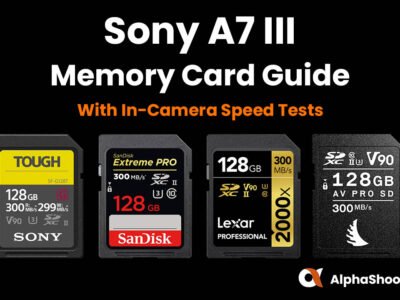
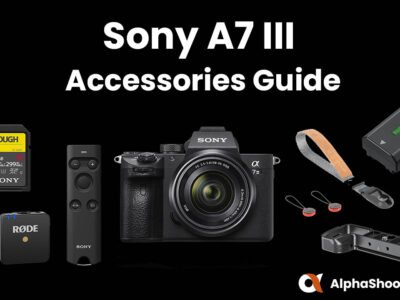
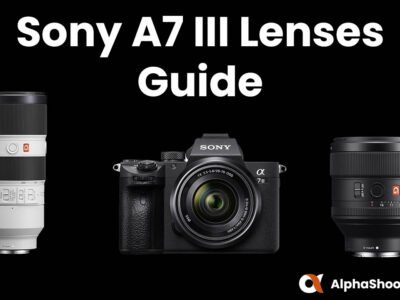
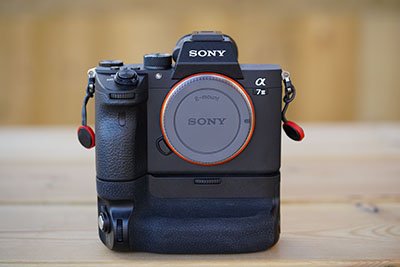
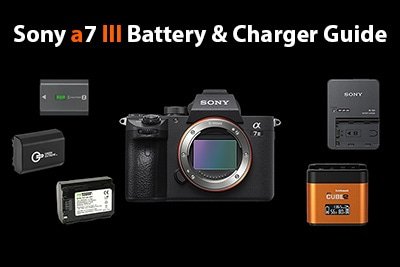
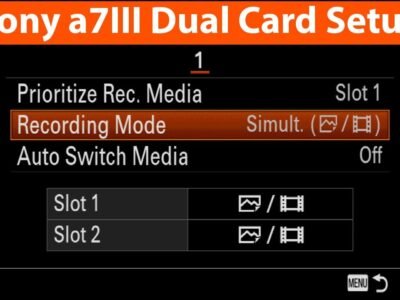

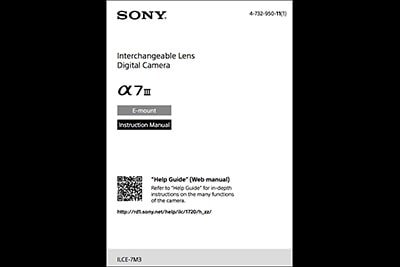


Just got my a7iii. This guide was perfect to get me started.
Congrats on your new a7III. Glad to hear that the accessories guide helped as well.
Super helpful website! Thank You for providing all this helpful information!
Dear Timothy,
I just wanna thank you for your work and for this website. I am new to the game as I recently bought a a7m3 and I couldn’t be happier.
When I looked for info on lenses, accessories etc. I came across your website.
This message is just to say thank you!!!
I went with a couple of your recommendations:
lenses – Tamron 28-75mm F2.8 Di III RXD // Tamron 70-180mm F2.8 Di III VXD
battery – NP-FZ100 RAVPower
Peak Design Slide V2
SC cards – Sony and Sandisk
tripod – Sirui T-025SK
intervalometer – Pixel TW-283 etc.
Kingston UHS II SD card reader
and I am very happy that I did.
Other things I bought and can recommend highly are (in no particular order):
Viltrox 85mm F1.8 STM
Eye cup (KIWI foto) FDA-EP18
off brand (mini focus) L-bracket (modeled after the smallrig, I guess)
off brand (Roolad) SD card protector box
and again, I absolutely love every single item.
Anyway, thanks for your hard work, much appreciated!
Hi Patrick. Very glad to hear that you have found the site and articles helpful in your purchasing decisions! 🙂 Sounds like you have added some great additions too! Hope you are getting on well with everything!
FYI the Synology DS220+ was released earlier this year. https://www.synology.com/en-us/products/DS220+
Thanks David! Mine is still doing great so I don’t think I’ll be upgrading just yet. Will get the article updated though!
Glad to hear that your DS218+ is still working great. Feel free to email me if you need any advice as far as Synology goes!
Many thanks David. It’s a great bit of kit!
Many thanks for your fantastic guide and help features. Re the Pixel TW-283, can I rontrol the Video on and off on my Sony A7 Mk3 with this remote?
I bought this Tripod for my a7iii: https://www.amazon.co.uk/gp/product/B079YF5YXY/ref=ppx_yo_dt_b_asin_title_o07_s00?ie=UTF8&psc=1
However, I cannot connect the plate screw to the camera, it’s just too big! Any ideas? Did anyone face something similar? I was thinking probably I should return the tripod.
Hi Alex. The a7III base has a socket for a 1/4″ screw, if the one included with your tripod is too large then you can either replace the plate or returning it is also an option. Personally I’m not too keen on using places so will normally use an l-bracket on my a7III then connect this directly to the ball head of my tripod.
Thank you Tim! Any good L-bracket to recommend?
I recently bought the Three Legged Thing Ellie Short. It doesn’t cover the battery compartment but you do need to pull the side plate out a little if you want to access the side ports: https://www.amazon.co.uk/Legged-Thing-Universal-L-Bracket-shorter/dp/B07Z53NDR1/ref=sr_1_1?dchild=1&keywords=three+legged+thing+ELLIE+SHORT&qid=1593763009&sr=8-1
Great review. Will certainly use this when I make the the jump to the A73. I really liked PD video about their tripod. Had no idea so much thought and creativity can go into a tripod… btw I am on Nikon now and will want to use my lenses until I develop a full set. Do you have any updates on the lens adapter? thanks.
Thanks Ralph, glad that you found it helps. It looks like the CM-ENF-E1 PRO adapter is now supported with the a7III with firmware update v07. (https://www.commlite.com/product/35.html). Unfortunately I can’t comment on the af performance but I wouldn’t expect too much from it when compared to native lenses.
Wow, what a fantastic article, thanks for writing this up. Really appreciate your time and effort putting into this (and rightly so, it’s the first result that comes up in Google search!) Will be taking some of these recommendations 😉
Did you end up hearing back from Sony regarding the issue with Sony SF-G Tough speeds with RAW? (From your memory cards and SD Card Readers section, highlighted in blue).
Cheers.
Thanks Chris, glad that you found it helpful! 🙂 Sony wasn’t too helpful regarding the SF-G Tough cards unfortunately. They wanted me to send them my a7 III to test themselves which I’m not going to do since I know there is nothing wrong with it as the none Tough SF-G cards are working perfectly and the issue with the SF-G Tough cards is only with RAW files. I’m half expecting it to be quietly fixed in the next firmware update.
I see… I’ll stick to the Sandisk Extreme Pro’s for now just to be safe 😉
Thanks again!
A cautionary comment on the Newmona batteries you mention. I’ve used Newmowa batteries on another camera – specifically for the Pentax K-1. The *stated* mAh of the Newmowa was “2400 mAh” compared with the proprietary equivalent of “1860 mAh”. But the stated mAh on the Newmowa batteries is *complete bull*! I tested this by running continuous video on each battery and found that under identical conditions the proprietary battery consistently ran almost 50% longer than the Newmona! In other words, if the proprietary battery mAh is accurate, the Newmowa really had about half of its stated charge!
Thanks for sharing this Socrateeze. Possibly Newmowa have improved things a little as a couple of reviews on Amazon mention that they last well and in some instances drain slower than the official Sony batteries. Although there are also more issues like slow charging and early failure. I guess you get what you pay for with this batteries unfortunately. Personally I still prefer to stick with the original Sony ones despite the expense.
Incredibly thorough!! Thanks Tim!
Cheers Chris! I try to keep it updated and will add new accessories as soon as I hear about them. All the best, Tim
Any OEM battery door cover for A7III?
Hi Clarence. The battery door for the a7III is a spare part and unfortunately it’s not so easy to get as other spares like the eye-cup which are on Amazon. The spare part number is: X-2594-592-2. If you are in the EU you can order it from here: https://uk.eetgroup.com/i/x25945922-sony-lid-assy-799-bt – In the US from here: https://encompass.com/item/11684340/Sony/X-2594-592-2/ – Or contact Sony Support and ask if they can supply one or suggest alternative suppliers. Hope it helps. Tim
Great job on the summary.
Thanks Ron!